#i love to read analysis!!!!!!!!!!!!!!!!!!
Text


The last interaction between Jon and Elias was amazing. Perfect. S5 was a rollercoaster (bless you Simon Fairchild , you won't be forgotten) of emotions and hearing the behind the scenes audio, it was a pity that they didn't go through the "fake normality before the apocalypse" initial idea, a la Mr Robot season 2. It worked greatly for them and I'm sure they're well enough skilled to have made it work even in TMA. Especially since the last ten eps were a bit.... empty? The statements were great but they got a bit repetitive, but at least it's, like ten eps in 200 so it's a good ratio lol
Jonah might have been scared of dying but I'm sure that Jon being the one that ended his life was a consolation prize for him. I love how, except for the Madoka Magica vibes I got from the whole multiverse plot, at the end, Jonah revealed his human side, his scared, terrified of death human side to Jon.
They knew each other at the pinnacle of their inhumanity but also at the height of their humanity... I think it's beautiful and truly fitting for their aesthetic.
True to the multiverse theory then, I'm pretty sure that there is also a reality where Jonah is ruling over the other fears in the Panopticon gently holding his precious Archivist, the means to his desired end, in his lap. A girl can dream and the multiverse being canon is my fuel <3
#jonelias#elias bouchard#jonathan sims#tma analysis#tma ships#i love them#i will ramble about them forever#i want to write a lot of fanfics about them i want to read all of the fanfics about them i want to think about them all day long
21 notes
·
View notes
Note
Good evening (or morning, afternoon, wherever u r) to you, Miss Raven, *tips hat* How do you do?
First of all, I was reading through the your canon Malleus romance analysis and i’ve just gotta say I love how you give a realistic approach to these characters and their world! 🙌🏻
But that also got me thinking, how would Leona prioritize his romantic vs royal life?
As second born prince, I wanna say Leona actually has more breathing room to pick whoever he wants as a partner (if the royal family doesn’t arrange a marriage before he gets that chance), plus, the Sunset Savanna’s next heir apparent is already born, so really there’s nothing worry about succession unless something happens to Cheka and or Falena. But at the same time Leona is still ridiculed by his people, so will that have any affect on who he wants to be with if he happens to choose someone other than another beast(wo)man or someone in a class lower than a noble?
And even tho he isn’t first in line for the throne, Leona is still royalty. I think he could pick a partner who is more private and less sociable with their life, but I also think they still might need to be prepared for the royal life, lack of privacy, speaking with the public, and other royal duties (even if Leona himself won’t do them).
TL;DR Do you think Leona’s status as second prince actually gives him a benefit for who he can pick as a romantic partner and how would the people’s view on him affect this, and what do you think would expected of Leona’s partner in the royal life even tho he’s not first in line for the throne?
What’s your take on this?
Related posts: Malleus / Kalim

Greetings 🎵 Life’s been a bit stressful lately, but I’m getting by! Busy planning something big for the blog too, so excited for that.
I think you must be talking about that post where I discussed what the expectations would probably be for Malleus’s future spouse? Thank you for the praise though! While anyone can ship themselves or their OC with Malleus in the latter, there’s certain in-universe logic that must be followed in the former. It feels very different to be a character in that world versus an outsider looking in. Being able to switch and see from those perspectives is important, I feel.
My thoughts on this topic aren't as concrete as what I laid out for my Malleus post, mostly because we don't know as much about Sunset Savanna's politics and since Leona isn't burdened by the same expectations as the crown prince or first in line to the throne. I feel like this post will be a lot of speculation, so just be cognizant of that.
As Leona is right now, I don't think he has much of an interest or an obligation to find someone. His focus seems to be on tending to himself and his own goals to help those around him, be it his juniors (Epel, Jack, Ruggie, etc.) or his country (due to his internship at a energy and mining lab). I definitely feel like that's where his priorities lie, and anyone he might take on as a life partner would also have to have a passion and dedication for this kind of service, whether they also engage in it or they at least support Leona's endeavors.
I also think that Leona would personally want an intelligent partner that's able to hold their own in a discussion, but only to a certain extent. Like, they have to be able to coherently express their own thoughts but I don't think he wants to deal with someone so stubborn that they constantly put up a fight with him if they happen to disagree. Leona has demonstrated multiple times that he finds it a hassle when people don't listen to him, so he tries to put himself in situations where he doesn't have to face that in the first place. For example, Leona states that he dislikes Silver and Rook, as they constantly act on their own and seem to disregard anything that others around them say. Additionally, he lacks a vice dorm leader because he made the conscious decision to not pick one, as he doesn't want someone challenging his decisions. Leona also strategically caves to his sister-in-law's demands to avoid wasting time and energy in an argument, since he knows that beastwomen tend to be strong-willed. His partner would have to know when to step back and give him space or when is not a good time to keep pressing a point. That means there'd be a certain element of emotional intelligence involved too, not just general wisdom or knowledge.
In these circumstances, I don't think there would be as much of an importance placed on the social status of Leona's spouse since he's like... what? Fourth in line to rule? His father is still alive, Falena/Farena is still fine, and Cheka's there too. The chances of Leona actually having to step up to that plate are low. There's no pressing need for Leona to find a partner or to produce an heir of his own. I don't recall there being lore about his older brother and sister-in-law having an arranged marriage or what social class his sister-in-law is from, so... there's not a lot to go off of there. I think, at the very least, we can assume there's not as much pressure for Leona to be in an arranged marriage since he isn't the crown prince.
I don't get the sense that Sunset Savanna is as conservative with its social expectations as Briar Valley is, so it's doubtful whether or not the public would care about a royal marrying a commoner or a beastman marrying a non-beastman. To my latter point, there doesn't seem to be as strong of a racial divide between beastmen and humans (unlike fae and humans), so I don't think this would pose a major concern. But hey, maybe they do care a lot about status since Leona's flashback keeps harping on the importance of birth order--but that ultimately has no baring on the commoner versus royal thing. Maybe this is me being too much of an idealist, but I do think it would be possible for Leona's partner to come in and prove themselves, since their reputation (unlike Leona's) isn't already marred by being second in line to the throne and having a golden child to be compared to.
If anything, I feel like the people would fear for the safety of Leona's spouse rather than what their "marrying outside of the norm" means for the country. Since there's a negative public view of Leona, I feel that this would translate into worry for the spouse rather than assuming they are "just as bad" as Leona. They're an outsider with a completely separate background from Leona's, and that I doubt that most people have the magic to rival his strength. Where would their fear of the spouse be reasonably coming from? I think the more likely situation would be the public feeling sympathy for the spouse (like, what if Leona's magic harms them) and wondering what they must see in the second-born prince. There might be a lot of gossip or concerns swirling around their courtship, little judgmental whispers and passing glances that are hard to avoid, maybe some hissed warnings to be careful around Leona, etc. The spouse should be careful how they react to public opinion though, as lashing out could make them be perceived as ill-tempered and crude, a poor reflection of both their own attitude as well as confirming preconceived notions of Leona. They should be equipped to handle socially complicated situations with grace and tact. When it comes to Leona, they should also be ready to provide him with some emotional support—not as a therapist he trauma dumps to or anything like that, but as a trusted and nonjudgmental confidant.
I think the spouse would receive the harshest scrutiny should they step into a more public-facing role… like if they started to enact or push for policies that go against the country’s reverence for nature and living in harmony with it. They would most certainly get pushback for it, maybe earn ire for not being “attuned” with its people. Leona’s spouse would, at the bare minimum, be expected to represent the values of Sunset Savanna and to engage in its ceremonies and traditions. For example, Leona—the second prince—is meant to train the winners of the Bead Brawl. Whatever royal duties are set for the spouses of the royal family… well, they should be prepared to fulfill them.
On the subject of privacy and sociability, it might actually be a drawback if Leona’s spouse were private and not sociable. Not being seen or interacting in public very often means people are left to their own devices and assumptions—and if Leona is the first person they associate with his spouse, it could lead to the public forming negative thoughts. "Oh, they're withdrawn because they don't care about us. Oh, they must be moody and hard to get along with." There’s a lot of earning trust that has to be done, especially if Leona intends to enact social reform, so I think it would make for better optics if his spouse really put themselves out there and was proactive in the community. Instead of framing themselves as a shut-away or some rando that married into the royal family, they have to be willing to step outside of their comfort zone and act like a leader if push comes to shove, show how outgoing and determined they can be.
Last thought I have on this matter I guess is related to how Leona’s loved ones would react. I don’t think the named characters would care about the details all too much?? Farena appears to respect his brother and treats him warmly, even when Leona brushes him off. He’d want Leona to be happy and at his best mentally and emotionally when and if he decides to help govern the country. And Cheka, well… maybe he’s a little too young to fully understand what’s going on, but I think he’d want his uncle to be happy too. I’d say even Kifaji would be on board with it, though perhaps not as openly as Farena or Cheka. He’s a stern older man, so I can absolutely see him scolding Leona and nagging him about his choice of partner—but in the way that a concerned grandparent would, you know? Not in an outright malicious way like the Briar Valley senators might. Unlike them, Kifaji can see the good in his prince and wants the best for him, even if he comes off as too overbearing at times. Kifaji doesn't unnecessarily act vitriolic or belittling to Leona, he states truths (that Leona acts improperly at times) and earnestly expresses his wish that Leona recognizes his own potential. He'll probably pull up to interrogate the spouse (because he cares that Leona marries someone who loves and values him), but ultimately give his blessings along with a plea for them to take good care of his second prince.
#twisted wonderland#twst#Leona Kingscholar#disney twisted wonderland#notes from the writing raven#question#disney twst#Kifaji#Cheka Kingscholar#Farena Kingscholar#Falena Kingscholar#Silver#Rook Hunt#Epel Felmier#Jack Howl#Savanaclaw#Ruggie Bucchi#Neji
58 notes
·
View notes
Note
I’ve been reading back on your posts, including those about Love Of My Life, and had a bit of an epiphany.
So for a long time I was adamantly pushing that the song is almost entirely about Louis (and maybe about Harry’s songs/album, but I didn’t fully develop that theory) and England was used as an excuse. But now… I think it’s both.
I think it’s about home as a general feeling - and both the location and the person that represent home for him. Many, if not all of the lyrics, lead to believe that his relationship with both of these is different from what it used to be - but not in a bad way: it is still present and evolving. “I won't pretend that l've been doin' everything I can // To get to know your creases and your ends // Are they the same?” is, probably, the best illustration of this - and, like a few other lyrics can be easily applied to a place, or a person, or anything that carries emotional value for Harry.
I also thought about “you WERE the love of my life” and “leave you behind”. This part is a bit more subjective, but I always noticed that in this song such lyrics lack the gut-wrenching longing and finality of many of Harry’s other songs (Falling and From the Dining Table, for example). So maybe that isn’t the idea at all? He isn’t leaving something/someone behind forever, but only for a while, while reminding himself that he truly cherishes those things and vowing to maintain his connection with them.
To me, this would feed into what I perceive as the overreaching theme of Harry’s House: “it’s not the same as it was, but it’s not bad, just different”. With other songs telling how Harry’s relationship with his partner (Louis), Harry himself, other parts of his life have evolved over time, I think Love Of My Life could carry a similar theme as well.
I think this is the best analysis of Love of My Life I’ve read. Truly. ❤️ And I agree with you about the overarching theme of Harry’s House (which makes me love the album even more).
27 notes
·
View notes
Note
Have you watched or read Naruto?
In high school I switched from parting my hair in the middle to parting it on my left side in honor of Orochimaru's dramatic one-eyed-peering-through-a-curtain-of-hair deal. For context: my hair looked as dissimilar from Orochimaru's as physically possible in every single way. It did not at all resemble that hair style. Nevertheless I still keep my hair parted over my left eye to this day.
One time I wore my Otogakure forehead protector as a belt during finals week to hype me up and a friend saw it and scoffed and said "you are not wearing that. that's so embarrassing" and that's the moment I decided we weren't friends anymore.
The only thing that's cringe is cringe culture.
For a long time the longest fic I'd completed writing was a 100k-ish one-sided hashimada tragedy about unrequited love spiraling out of control.
Anyway I was keeping up with it til partway through the fourth shinobi war and then life got in the way and prevented me from hanging out with my weekly midnight naruto analysis book club and I fell off it. I'll come back and read the ending someday.
#anonymous#ask#naruto#(probably one of the top 3 fandoms I spent the longest time hyperfixated on? Up there with Transformers and Invader Zim?)#(top 5 for most fic I've written for it too I expect.)
27 notes
·
View notes
Note
What is your opinion on the Beetlejuice 2 Dream Theory?
This theory?
My opinion is that it's very likely to be true. I walked away from the cinema extremely happy with all of the shippy moments—so happy I hadn't even considered theorising anything yet, however my first thought about the ending was, So it was all Lydia's dream?
I read through the post and was blown away by how much sense it made, but I think it helped push me to believe it when my friend sent me this
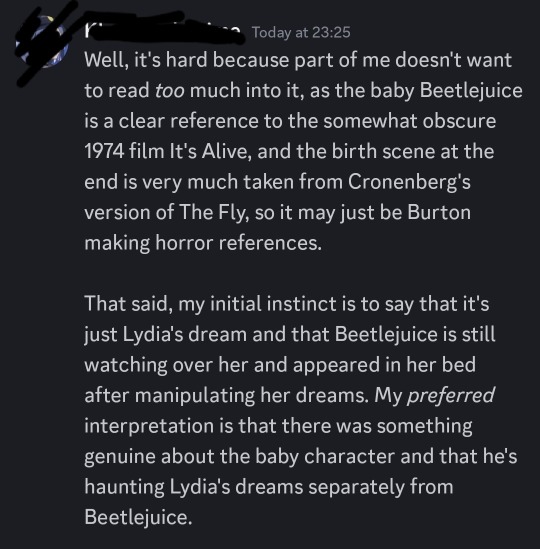
My friend is not interested in theorising or shipping, and has no connection to the BJ fandom, he's just a horror fan. Yet his interpretation of the movie's ending was a summarised version of the whole dream theory. Isn't it far more romantic to imagine Lydia having spent her life with Betelgeuse, and he's indulging her with a dream of her own child? Considering they both have a 'psychic connection', I'm not convinced that Lydia hasn't been thinking about BJ just as much as he's been thinking about her.
This user pointed out both of Betelgeuse's love songs are by artists named Richard, conveniently the name of Lydia's previous partner. The same partner who was described as a horror fan that loved playing pranks, and dressed as a Beetlejuice lookalike for Halloween.
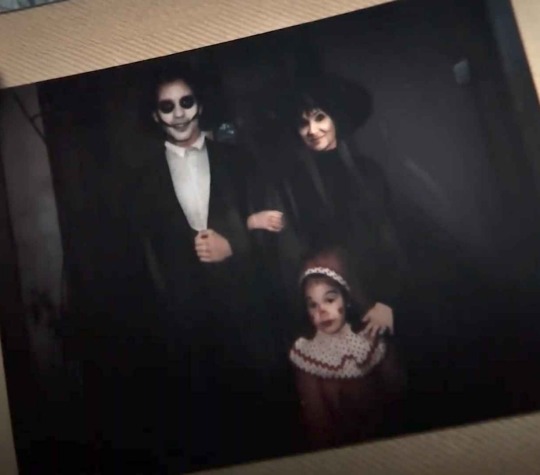
Looks like Beetlejuice, acts like Beetlejuice—either Lydia is equally obsessed, or it's BJ projecting himself onto Lydia's human lover within the dream. Watching the movie with new eyes, I noticed in the "Later, fucker" scene that BJ is sitting in the same place Richard sat while working at the border control. "Astrid" herself has a name related to the celestial bodies, much like "Betelgeuse". You can either take this as a romantic parallel, or Tim is trying to show us that Richard's creation is based on Lydia's fixation with Beetlejuice.
Dream sequences often use characters to represent something within the dreamer's psyche. It's like an abstract analysis of the way that character thinks and feels. Astrid's sequence within the dream shows Lydia's material desires—it confirms everything was based off of what Lydia wanted, which included getting married to a 'monster' (in the sequence of events, Astrid marries a guy dressed as a vampire), and then gives birth to the Beetlebaby. I know in the first movie there is a reference to the horror movie "The Fly", so I imagine this was too.
Did anyone notice the dream sequence watching Astrid didn't actually have a clear indication for when it began? It transitioned from the movie as if everything was a dream right from the start.
Let's not forget BJ straight up looking into the camera and saying "I love a good dream sequence". Lol.
My other reasoning for believing the dream theory is what Winona said about Lydia. Winona and Tim are close friends. Winona pitched the idea of having Betelgeuse and Lydia be the endgame ship in her words, and she happily took part in this movie. If Tim had rejected the idea, why would Winona reprise her role for a story she didn't agree with? Winona knows that Lydia is Tim's self insert (Tim has said many times he relates the most to Lydia), so why would Tim approve of all the shippy moments if he opposed Winona's pitch? No one knows Lydia like him!
Winona said in this interview that she hadn't imagined Lydia ever becoming a mother, but that after a while it started to make sense. She does not elaborate on that, but explains her idea for Lydia was that she would end up a spinster in the attic. If you read the dream theory, it highlights how the movie begins with Lydia in the attic, and then transitions to Lydia's TV show, but the background is still the attic. I found the whole film very dreamlike in this way, and I think the fact that Tim has said Wizard of Oz (a movie where the girl wakes up after a dream, in which those she knew acted as characters within the sequence) is one of his favourite movies helps to put it into effect.
And finally...
It's Lydia Deetz. Lydia loves the strange and unusual.. do you really think she wasn't curious enough to contact Beej again?
#beetlebabes#beetlejuice 2#beetlejuice beetlejuice#please read the full theory though 👀#i only touched the surface
35 notes
·
View notes
Note
whats very critical to me is barty being this sheltered twitchy nerd with freak tendencies and terrible terrible evan looking at him like “hm i could fix this guy” and what he means is making irredeemably evil
i need a complete barty analysis from you, that would save me.
i love the idea of evan slowly corrupting barty with his silences and smiles, instead of the opposite. evan perfectly embodies the role of a high school bully from some wattpad story or netflix show: he kicks a pebble with his crocodile leather shoes, which hits barty's back, who turns around angrily. and barty's the silent boy who takes the insults and teasing in silence, without reacting, until one day evan goes to sleep and barty comes out of his closet and tries to slit his throat.
barty bursts into tears (yes, i read one of your last posts) and evan has a crazy thought, completely inappropriate to the situation.
that "i can fix him" = "barty, you don't have to hold back, if you want to kill me you can do it. please. you'll feel better. please"
#i might have misunderstood everything in this ask but it was funny anyway#GIVE ME ALL YOUR BARTY THOUGHTS IN ONE PLACE PLS I NEED THEEEEEM#barty crouch jr#evan rosier#rosekiller
23 notes
·
View notes
Note
Bolter Steve leaving like that to go to Peggy, then leaving her behind again as well and coming back to the present right as everyone's starting to settle into a new kind of normal is going to be wild and possibly devastating! I look forward to seeing it all play out (and seeing Steve come back with an apology puppy in hand), but I hope Bucky doesn't get hurt yet again in the process.
Steve's always such an active force, his choices can affect so many characters deeply, even when he's ghosting them. I like seeing the consequences of that; it's so interesting how he's running from his persona as cap thinking that'll free him of this weight he carries when really it's actually an aspect of him that has always been an intrinsic Steve thing. He's someone who's always been fighting battles and moving towards something, so it makes sense to me that he could have trouble really staying present in a moment or with someone long term.
I think mc and Bucky being something softer yet more rock steady with less dependence on their surrounding circumstance is so compelling. Steve and mc's thing felt like a passionate escape from reality, but Bucky seems more like he's someone who can settle into a reality with her, in the present moment. They have something that seems like it could be just as deep even if it's less intense, which for them seems actually like a very good thing.
Sorry to Steve but not that sorry, I think I'm leaning team Bucky for now.
I also love how Mobius and Loki were when they showed up, Mobius being chill and playing nice, Loki being fair, but very cheeky and definitely enjoying having the tables turned
The way Steve haunts the narrative even when he's (supposedly) gone for good 🥲
No truer words were said, luv. You're so brilliant for this. Bolter Steve was never going to belong in the past – not anymore, not after falling in love with the reader. He does deserve peace and a home. But he has to realise that the peace he's looking for is no longer that idyllic, domestic, apple-pie vision. It's being of service. It's fighting for what he believes. Helping his found family out and being a part of their happiness.
And his home? Let's just say it's not with Peggy, or the idea of her.
I see Steve and the reader/oc as being soulmates, while Bucky and the reader/oc are twin flames.
She never had a shot at some kind of normal with Steve, but that was due to the circumstances. She can have that with Bucky now, but her love for Steve is hard to shake off. What happens when he comes back, willing to commit to her? Can she trust him, or will she choose otherwise?
Anyway — I love your analysis. It's so spot on.
Thank you for reading! 💙🤍💙
#answered#the bolter#angels on the feed#steve rogers x reader#bucky barnes x reader#steve rogers#bucky barnes
22 notes
·
View notes
Text
Goultard's accidental queer coding
(And, incidentally, why I headcanon Goultard as transfem/not cis)
Disclaimer : i say goultard's queer coding is accidental because i really dont believe that gou was intended to be read as queer when tot wrote him. Nonetheless, the subtext is still present and i believe any queer person would assume goultard to be somewhat queer while reading the manga. Interpretation can be different from intention. Also, and this applies to most of what i post, i share my personal analysis and interpretation and everyone is free to have their own.
(I got lazy and don't want to format this post properly, so this mess is what you get lol)
Pariah to hero.
Goultard was an outcast since he was born. A very common trope in queer coding.
After he proves himself worthy by showing he can be of use to the village. He's respected, adored, almost worshipped. But only as long as he fulfills the narrow role people want and expect from him. He's rejected and insulted as soon as he doesn't fit into this role.
Strict traditional masculine gender roles are forced on him. The protector. Stronger than any opponent, stronger than himself and his emotions...
I also think of his condition of being a son of iop, this sword of damocles hanging over his head, as a nature that is imposed onto him over and over again when he didnt choose it and doesnt want it. Being a warrior is supposedly in his blood its what hes good at and therefore should do, settling down and having a family is supposedly contrary to this nature. Even though its what makes him the happiest.
I wonder if traditional gender roles vary from one class to another. Is there any specificity between iop men and iop women. If iop men are by default considered more iop than iop women. Is feminity synonym with weakness for iops. Must a iop woman choose to never settle down and stay a real iop or abandon her warrior status/her iopness to raise offspring at home while the iop men can keep fighting. Maybe class affects the form sexism takes.
Ive joked about gou being in a polycule with three outcast witches being proof he isnt cishet and that the three of them were waiting for gou to figure his shit out... kinda real
After being possessed by the symbiote,
(Which can also be seen as him failing at his role of protector, failing to protect his family. He blames himself for it) the way he's rejected, dehumanized, called a monster, a creature, specifically not a man, and at the same time mocked, can be very reminiscent of queer phobia.
His relationship with the symbiote is reffered as them being a couple and compared to a romantic/sexual relationship.
It feels to me like, while gou was possessed, and shortly after, he could allow himself to step out of that preconceived idea of masculinity that comes with being a "hero", and indulge in the gray areas. Not a human or a demon, not a god or a mortal, not a man or a woman. While still having deeply internalized cisheteronormativity, grasping for some "normality" whenever he's faced with someone else's opinion of him. Needing to justify and prove he is not queer, prove he's man enough, prove he isnt weak, like he needs to convince himself as well as everyone else. Hating the subject but bringing it up unprompted. Always overcompensating.
There is something reminiscent of being in a queer relationship for the first time and it happens to be incredibly abusive. You might feel like the abuse is worth it if it means being allowed to be more authentically yourself, you tell yourself your abuser understands you and loves you for who you really are even if they hurt you, and the queerness of the relationship isolates you, making it impossible for you to get help to leave said relationship.
But much later, when his reputation got better (how much did he have to do with it, how much of his reputation is what he carefuly build it to be) and he had to take his father's power and become the new iop god, the pressure to act a specific way, to fit into this box, would have come back. The whole "iops dont cry" thing with gou denying and hiding his emotions in wakfu.
He's often reduced to that image of the unbeatable warrior, the ideal masculinity, the very definition of what a iop should be... what he thinks he should be.
He gets enraged at his fans for essentially worshipping a fake idealized and shallow version of him, making money off of his image and reputation, but rejecting him as a person, his humanity. They dont want to know who he truly is. He wants to be respected for his heroic actions, not because of this fake idealized vision people have of him.
(isnt it fucking hilarious that this is exactly what wakfu and a lot of the fandom does to him too sorry I'll stop being a hater).
Goultard's reputation and how he feels about it is a fascinating subject. Very confusing but thats because he is himself confused about what he wants it to be, but it sure is extremely important to him.
In the end, goultard recognizes the only people who knew and understood him are dead.
His emotions are seen as unmasculine and ridiculous because theyre too intense (seen as hysteric, too sensitive) Vil smisse says he's "worse than a chick". They say he has his mother's character whos literally named cabotine (hysteric).
He sees himself as a poet, someone sentimental, complains that people don't see it, don't recognize it, can't/don't understand this part of him. Kills an entire village because they didnt appreciate this part of him (a little excessive maybe lmao)
The way he presents, wears dresses as a child, skirts later in life, long hair with accessories... not necessarily effeminate but kinda androgynous hes gnc af or whatever. (I dont know what other people think but he always looks super androgynous to me, except in wakfu) Hes very goth looking in the manga which is also queercoded in itself.
His entire relationship with arty like come on.
People call him a homo and assume hes a homo thats pretty queer coded to me lol
Even the text makes fun of him for being the way he is. Hes often shown to be sort of a ridiculous person. Its not just the other characters who think that. They dont really expect you as a reader to sympathize with gou for being ridiculed. There are a few moments that feel gratuitously sadistic towards gou.
Arty also gets disrespected/has homophobia directed at him but always in relation to gou
(People assume arty's queer BECAUSE he's with gou), gou is disrespected/has homophobia directed at him way more and not always because of his relationship with arty (people assume gou's queer because he looks and acts in ways that make people think hes queer)
The whole thing with arty being a dragon is pretty queer coded too, discovering his true nature and being rejected for it, learning to accept himself etc...
But its such a classic trope it also fits other interpretations. Im thinking notably about growing up mixed, hes rejected for not being "human" enough but also not "dragon" enough, too much like a "human" or too much like a "dragon" having trouble figuring out his identity and accepting it, he inherits a long, complex and painful history from one side of his origins, fights to be seen as legitimate by the other dragons, very steven universe-esque.
And it's just very much coming-of-agey in general. His body changing and having new confusing emotions that he struggles to control. Facing new responsibilities. Kind of spiderman like. They do make a little joke about artys adoptive grandpa crail being like his version of uncle ben. So its also a metaphor for growing up in general.
27 notes
·
View notes
Text
could we stop with the nasty comments? thanks. Its just started again, but I'm putting an end to it just as quickly.
You can't just base my Stonathan analysis off of one of the minor little post with barely any details and say stuff like 'this is a joke right?' No it's not a joke. I am telling my interpretation on Stonathan throughout the show finally and it requires making a lot of posts including 'mini' ones that aren't as great/convincing as the bigger posts.
In order to understand my take on Stonathan, you need to read the entire thing or most of it anyway which I can't put all in one post.
So...not every single post is going to be a champion ok? I get it. its not gonna be like in every post 'omg this is hard core evidence that they're in love'. No. It all has to ADD UP. Its not just one thing or two things, its the whole story. If you don't care to know the whole story, fine, but don't make fun of me for telling my interpretation of it when you only read one little post that doesn't even begin to cover it.
I already have to force myself to share this on here cause I know I'm gonna get a bunch of nasty comments, ok, but I wanted to share it with ppl who also ship Stonathan so they can have content and we can talk about something we enjoy. Is that ok? Do we have the rest of the fandoms permission to do what every other shipper and st fan gets to do on here? ...Great thanks. I'm just so tired of getting hated and bashed for being a Stonathan fan. Its been too many years of this now.
I've been trying to get this done for two years and it wasn't easy. This is a lot of work. I've been sick and thats why I have time to finally post this stuff, and its consuming a lot of my time. Its a lot to deal with. So please don't come at me with your nasty comments. This is taking a lot out of me to set this all up and get it done so other Stonathan fans can enjoy it before S5 comes, the last thing I need is nasty comments from anyone. Especially someone that only read one post and decided that all the rest of the posts about it are garbage.
If you don't like my ship, fine, but please don't come at me with your nasty comments about it when I've spent a lot of time and work on this.
When I see ship analysis I don't agree with, I don't say nasty comments to that person. I just scroll.
Not all of the Stonathan points I am making are going to be gems to every single person ok? I'm trying my best trying to share everything I can for the ppl who want to read it.
#stonathan#stranger things#st5#stranger things 5#jonathan byers#steve harrington#stranger things season 5#will byers#mike wheeler#byler#<target audience#st season 5
24 notes
·
View notes
Note
CHARACTER OPINION THING THAT IS LATE DO MORGOTT
Morgott my beloved you're how I got my start 🙏

🍂 favorite thing about them
I have a soft spot for antagonists who are royalty/powerful but also huge fucking losers. I think Morgott is one of the most fleshed out characters in Elden Ring, I love that despite being tragic he's also an awful person who continues to perpetuate the system that opresses him and others like him. There's so much to unpack about Morgott in the character analysis department.
And tail. Tail is nice.
🍂 least favorite thing about them
The fight in Leyndell with him, I don't like how he won't stop fucking moving good lord.
🍂 favorite line
"PUT THESE FOOLISH AMBITIONS TO REST!"
🍂 brOTP
Morgott and Oleg. I didn't even know they had lore together until I saw some fanart and read some fanfiction, Hell yeah let Morgott have a friend.
🍂 OTP
Morgott and Hilde :}
🍂 nOTP
Morgott and Mohg :{
🍂 random headcanon
His skin is very tough and thick, akin to tree bark.
He likes tea, particularly herbal teas.
In his free time he enjoys reading poetry and picking leaves out of his tail.
🍂 unpopular opinion
I like Margit's ost more than Morgott's.
Also he would not have been a good Elden Lord. He was closest thing we had to an Elden Lord in the story and the lands between still sucked ass.
🍂 song i associate with them
youtube
🍂 favorite picture of them
I have it on my desk uwu
20 notes
·
View notes
Text
So, I absolutely love "No Longer You" from Epic, and there are some things I've realized about the lyrics on the release of the recent sagas, so I wanna do a little analysis about what all of the prophecy prediction lyrics are about.
Okay so first line; "I see a song of past romance"
This is specifically referring to "Suffering". The siren featured is singing and pretending to Penelope. She's literally singing a song of past romance (since she's using his memories to create the image of Penelope, hence "past")
"I see the sacrifice of man." You could read this as a reference to Odysseus becoming a monster, sacrificing his humanity, but it's also definitely about what happened with Scylla.
"I see portrayals of betrayal and a brother's final stand," this about is the mutiny, I'm assuming the betrayal is the betrayal on both sides.
So, with those 3 lines, we have a direct retelling of the Thunder Saga, in order! I knew when I first listened to the song that the "brother's final stand" thing was the mutiny, but relistening, it's *incredibly* accurate to what happened.
Next is more unclear: "I see you on the brink of death, I see you draw your final breath" Now, you could reason that this is Odysseus nearly dying at the end of the Thunder saga, but so far, the lines have been VERY specific, so I feel like "I see you draw your final breath" might be something more specific that hasn't happened yet. If that's the case "On the brink of death" could very well be when Odysseus is on the Cliff in "Love in Paradise".
"I see a man who gets to make it home alive, but it's no longer you" This one is pretty obvious even before the recent saga releases, with the themes of the musical the point is clearly that Odysseus will make it home, but he'll be so changed he'll no longer be the person her currently is.
Now the middle verse!
"I see your palace covered in red, faces of men who had long believed you're dead," This is pretty clearly about Odyseuss getting home and killing all the suitors. His palace is red with their blood, and they *long* believed him dead, but now they see he isn't. I think most people know this one.
"I see your wife with a man who is haunting, a man with a trail of bodies," Now when I first listened to this, I thought this was referring to Antinous. But what I realized, and why I wanted to go through all the lines of this song again, is that it's not. It's Odysseus! He killed the suitors, and in general, has a trail of bodies from all the stuff on his journey, and this is line, that makes Odysseus so upset, is about him seeing his wife again!
So yeah! Tiresias is truthful, he is the prophet with the answers you seek. He's 100% correct in all his predictions, even tells them in order! And when Odysseus complains about coming all this way for nothing, he even tells him he's gonna see his wife again!
Unfortunately, his wording is absolutely terrible XD
17 notes
·
View notes
Text
Ortho Shroud and Love.
I feel like a lot of people miss out on the opportunity to really deep dive into Ortho's psychology. I'd like to see a story that focuses on Ortho figuring out what love is. Like not him just downloading the definition or watching a bunch of cheesy romance movies. But him genuinely trying to actually understand what LOVE is.
Let him think and contemplate his relationship with Idia. He understands why he was built, but perhaps he gets to a point where he truly starts to think more on it. When did his programming stop just him taking care of his brother and when did it come to be actual affection?(I actually need to read through book 7 so yeah....)
Can you program love or can a robot learn to love? Can he love if his robotic parts are granted a soul? Is he still just a robot if he has a soul?
Him learning about how his family loves him. Not for being a replacement but for being HIM.
Deep dive into him learning how the others perceive him as more then just a robot. How he's not just "a robot, or Idia's brother" he's Ortho. Their Ortho. Ortho their friend. Feeling he finally understands what a friend actually is. He has actual friends! His friends.
Let him actually ponder on the nature of romantic love and whether or not it's something he can learn. Would his programming eventually allow him to mature mentally? Can he be programmed to mentally mature? Can zeros and ones act like the chemicals in a human's brain? Would it eventually allow him to really "feel" any kind of "this person is more special then the others?" like he understands that he loves Idia as a brother. But for the first time maybe Ortho finds somebody who he wants attention from.
Maybe he begins to wonder why he wants to take something his brother has. He's usually happy if somebody is giving Idia positive attention but it's the first time he finds that he wants it for himself. He's never felt that way towards anybody. Maybe he thinks at first it's because he sees them in a familia way, but then he noticed how it doesn't feel the same as with them. He doesn't feel the way he does for Idia.
He searches through his memory banks but nothing seems to really match and he's certain it's not a programming flaw, Idia is very meticulous with his diagnostics. So why does he "feel off?" Why does he "feel off" more often whenever this person is around?
And then maybe one day he's in club and they're watching romance movies and of course the film club is doing an analysis about them and it's during this that Ortho thinks.
"Was what I felt love?"
And now you've got Ortho doing a deep dive of different kind of romances and maybe he's trying to figure out why exactly the characters are falling in love. What is it that drew one character to another? Why do these two happy together but yet they refuse to say they're together?"
Just him trying to actually understand how romance between people work. Him watching movies, reading romance stories, him just researching. He spends his time analyzing genres, archetypes, popular tropes based on different demographics. Historical couples that were happy vs those who did poorly. Different books and articles that talk about successful relationships vs. ones that fail. Reviewing anything he has on his parent's relationship. They seem to be happy together. The info he finds would say they're behavior could be romantic. All this time he's trying to understand.
"What is love? What is love that can be considered romantic? Can he love somebody? Can he love them enough that he is IN love with them?"
"Can he love somebody in a way that isn't platonic?"
"Can a robot fall in love?"
"Can he fall in love?
Give me more stories about Ortho exploring his nature as a robot and him evolving feelings as a realized being.

#ortho shroud#I feel like this could be read as somebody who's asexual but not aromantic.#Or an aromantic trying to understand why people feel romance#Platonic love#Asexual#aromantic#I feel like it could almost be shoujo like?#Or a good psych story#A love story that isn't actually a romance?#But trying to learn what “love” is?#Or even written as a kind of coming of age story#Depending on how you write it#Could be very angst as well#twisted wonderland#twst
16 notes
·
View notes
Text
Falin who cares too much and too little - analysis
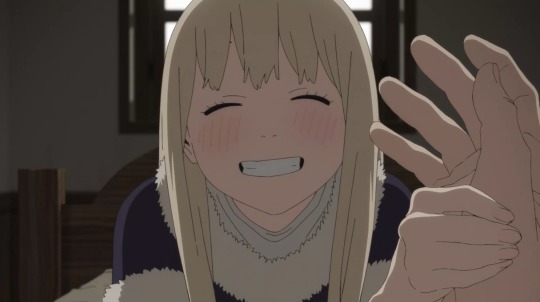
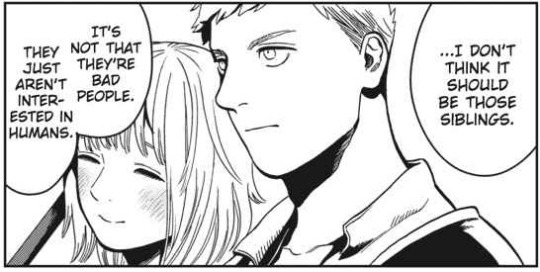
Been stewing on Falin thoughts for a while, I know I have an interpetation on her that differs from many but I’m jumping into the fray. I think there’s a lot to be said about what we do see of Falin.
This shorter Falin analysis I made is heavily encouraged prior reading. This analysis mainly explores her complex relationship with caring and so it’s sort of structured in two halves, with Faligon at the crux of it all.
Falin cares too little :
A lot of people assign Falin a people pleasing mindset and I… Don’t agree. We never see her care at all about people in her town or at the academy not liking her.
We do see her worrying about what people think of her… ONCE. And Laios comforted her, told her they didn’t matter and she should be proud of herself. She latched onto that hard. That’s why this scene was so important to be included during the dragon fight, relationship-defining; it’s always been them against the world. She grew to not care what others thought, to only focus on her close loved ones. No one else matters.
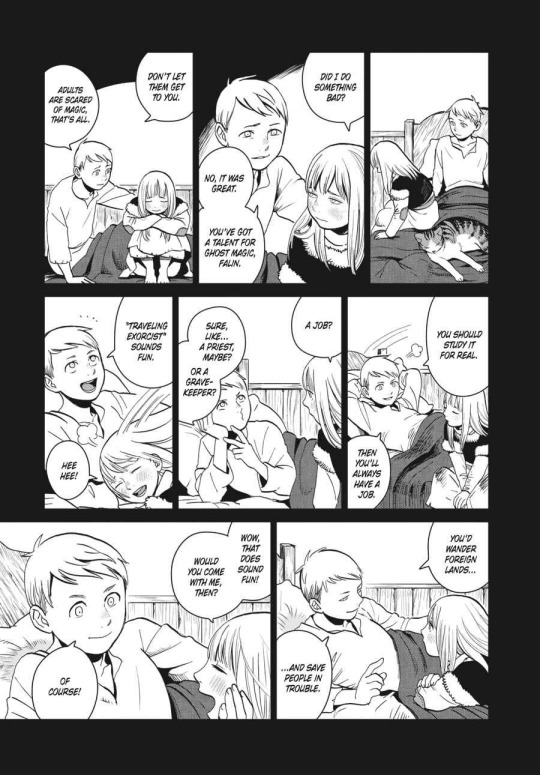
Laios’ words were her world. Her older brother who taught her how to feel comfortable with herself, who told her, you’re great, others are the ones in the wrong to not see that, I’ll always be with you, always be there for you. Older brother who always made great plans, who always knew more, who was better at wrestling to name the dogs, who she has always idolized.
Laios who always spoke of traveling the world, to which she always said she wanted to follow. And she would, she’d follow him even if it meant leaving the academy and all she knew behind, she’d follow him to the ends of the world, and that’s what she did.
She didn’t care about showing to her classes or keeping up such appearances, she doesn’t even think of toning down her jumping into bushes when Marcille recoils, etc. She acts like an obedient pawn often, to her parent’s directives and then following Laios around no matter what he decides to do, but I don’t think the motivation is people pleasing, rather it’s being with & caring for her loved ones, and her go-with-the-flow attitude enhances the impression. Not that it’s as simple as that, mind you, but let’s talk about this for now.
Falin is perceived as selfless because we, the audience, have our perspectives revolving around the main people in her life (Laios, Marcille). They’re the ones she’s devoted to and people who care about her back a lot too, but to people like her classmates or the towspeople she probably must have seemed like someone who didn’t care about the people around her or her surroundings a lot, who just went on alone and did her own thing.
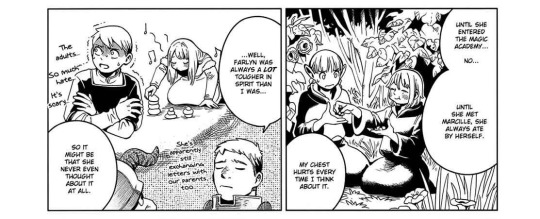
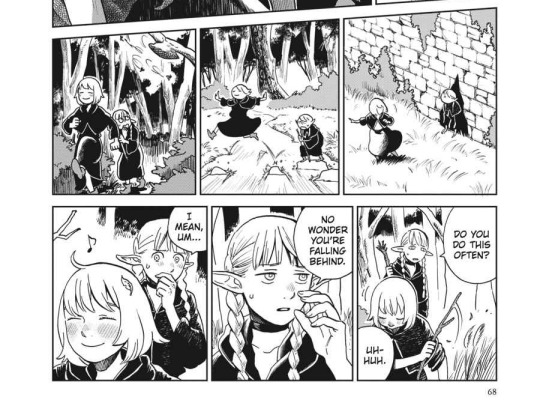
What matters to Falin? From what place does her kindness come from? Is a part of her keeping up appearances?
And I think that’s the point, the horror of Faligon as well, that we can’t tell just how in control Falin the person is as the chimera (because we are shown that she’s in there, we just don’t know at what degree), that we don’t know her enough to be able to tell when she’s at her most genuine, her most raw. That even if you do settle on none of her being present as Faligon, we have to at least consider it, consider that she may be able to do something like this and have a part in it, brutal and uncaring. That even the lenses we see her through, the people who love her, may be unreliable.
And this is what’s very interesting about her too, she truly is so idealized by people around her as a saint. She’s so good and kind and caring to everyone etc etc etc. Laios, Toshiro and Marcille all see her as the paragon of goodness in the world. More cynical characters like Namari and Chilchuck have more layered opinions on her, the latter finding her somewhat unnerving because he can’t read her well. But then with that one flashback scene we see that… Her priorities are intensely focused on Laios and Marcille, she doesn’t care all that deeply about anyone other than them (+ maybe her parents). The rest of the party is in the same danger here but only Laios and Marcille who she’s speaking to get the special ,ention, and if they don’t cross her mind then of course she’d be ready to sacrifice strangers through a risky teleportation.
That doesn’t make her not kind or caring!! Just that greater good isn’t exactly her priority. Any means is alright if the end result is her loved ones safe, it usually takes the form of healing and caring, but we see she’s ready to fight and make dangerous calls too. To me there’s this aspect to her that she isn’t as pure and magnanimous as everyone thinks she is, both in-world and interestingly enough meta wise as well, and there’s something interesting to that.
People pleasing implies a need to be liked, needs for the motivation to be that. A yes-man, etc. But if we analyze Falin, her general kind, smiling demeanor is more a matter of passivity I yhonk. Conflict avoidance is easier, so she’s friendly and hopefully things’ll be smooth sailing. It’s easy to be kind to classmates even if they act wary and rude if you don’t care about what they think either way. Of course she prefers good things happening to people over bad things, she is genuinely kind, but I think people tend to assign her a very grand altruistic way of life when to her the motivation is pretty self-centered. She doesn’t do what she does because she loves them, but because she loves them.
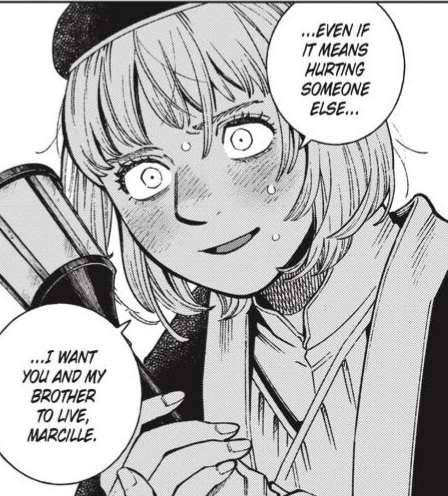
One situation that’s interesting to dig into for her way of thinking, and what I’m trying to get at, is Shuro’s proposal to her. I’ve seen people saying she hesitated because she didn’t feel comfortable saying no even though she wanted to, "I can’t say no, I don’t want to hurt him", something that sounds sensible and familiar, but it’s actually canon in the Adventurer’s Bible that the reverse was the case, that she didn’t feel comfortable saying yes. Because the offer was tempting, but it’d have been a loveless agreement on her end.
And it makes sense she’d want to say yes too, like we see with the Toudens, marriage is very much a political strategical economical thing in their village, there’s even a bit on it on Laios’ Adventurer’s Bible profile about dowries, and both siblings were engaged very early. They lived poorly for a long time, it’s an enticing idea to marry rich, to have not only yours but your brother’s needs met forevermore easily, which at one point in their careers was their main worry and goal. Why shouldn’t she accept a life of leisure and wealth handed to her by a lovely friend?
So her hesitance was "yeah that’s convenient for me, but where it’s everything to him and heartfelt I’m able to be detached because I don’t care about it that much… Can I do that? I’m not reciprocating, not saying yes in the way that matters. Can I do that to him?"
Very caring even though it’s not what you’d expect, isn’t it?
And central to my analysis, where I’m going with this is, I feel like that’s the thing with her character, that she doesn’t feel as strongly as she "should" sometimes, or feels a different way than she "should", or at least that she feels that way and others say she does.
She didn’t mind suddenly leaving the academy, leaving Marcille behind and not seeing her for 4 years. She acted like it was no big deal that she sacrificed herself after getting resurrected after the red dragon fight. And in both those cases it upset the people around her greatly that she didn’t seem to get why it was such a big deal, didn’t seem to care about how they’d experienced her choices.
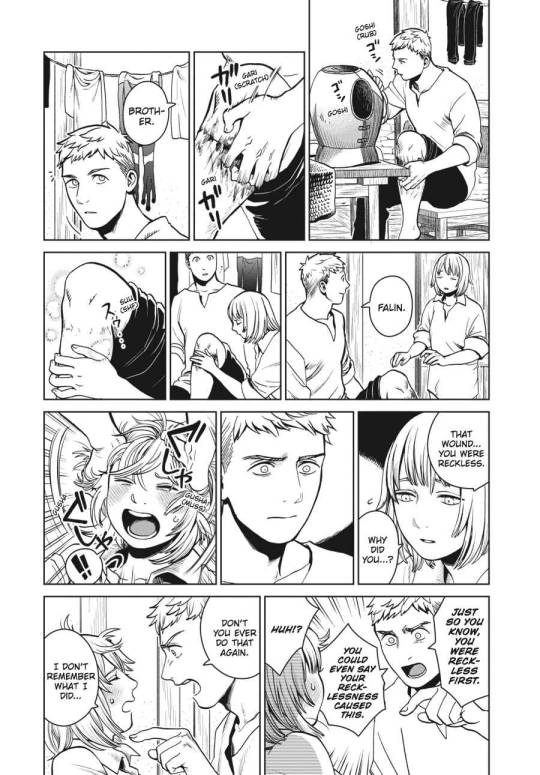
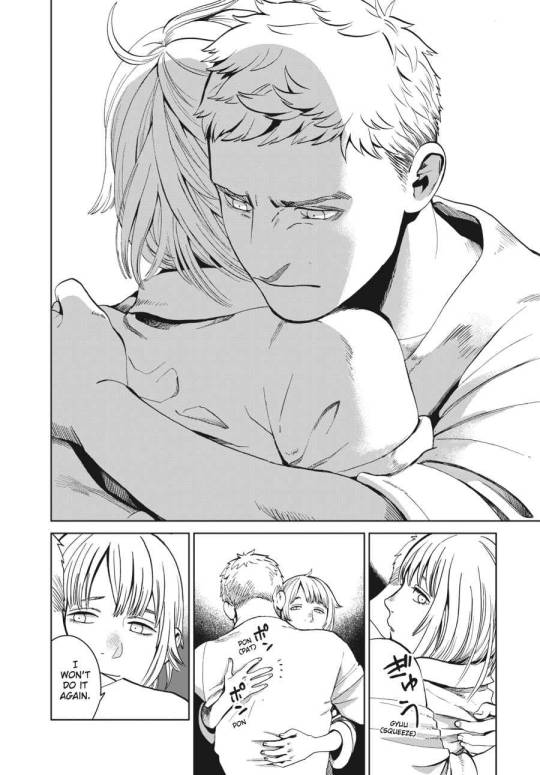
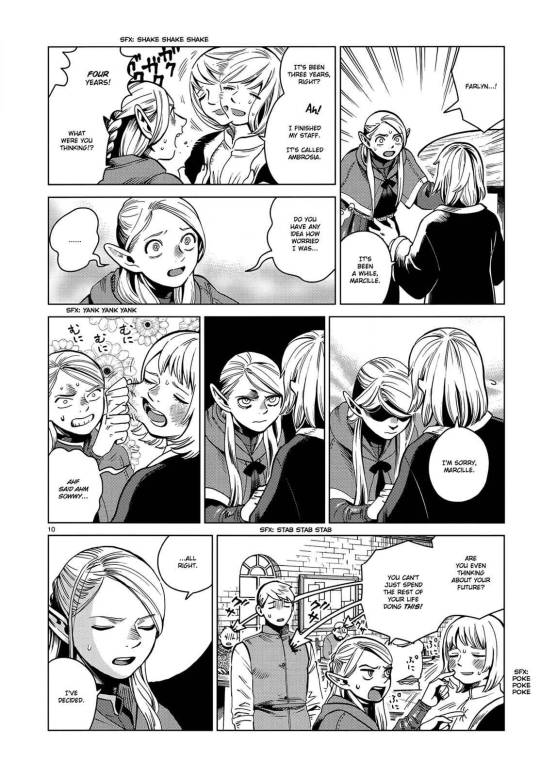
So it’s a tendency… And it’s not that she doesn’t care, it’s just that the way she measures what’s good for the ones she loves isn’t the same as what they themselves think it is (like Laios and Marcille not wanting to be apart from her). It’s an overt but quiet kind of care, it’s doing things like following them around and making sure they bathe and have a meal, even if that means she has to be dragged into misery too.
So yes she probably would know "not caring enough/the right way" is one of her perceived flaws, and that informs how she tries to handle her response to Shuro’s proposal. Her not wanting to accept like her first gut instinct, is because she’s thinking about reciprocity, about if it’d be right to go into this knowing that they have different priorities and she might not be able to keep up with the type and amount of emotions he wants/expects from her.
And that’s a big part of her character isn’t it, having expectations pushed onto her. Her trying her best, but in her own way that may seem odd or even unfeeling. Not unlike when she exorcised the ghost as a kid too, unblinking and matter-of-factly, and not seeming to understand why people stared the way they did.
Even though she answered his proposal only post-canon, she’d been pondering it for a while even pre-canon and the Adventurer’s Bible explanation was released midstory, so I’m hesitant to assign her much growth about her hesitation and what I went on above, since she still didn’t react "right" with Laios after the red dragon fight (even if she apparently doesn’t remember sacrificing herself) and put herself in that situation in the first place. She hasn’t finished her arc on that flaw of hers is what I’m saying, she for sure still has it, but I certainly think her thoughts on Shuro’s proposal shows awareness, both of herself and social.
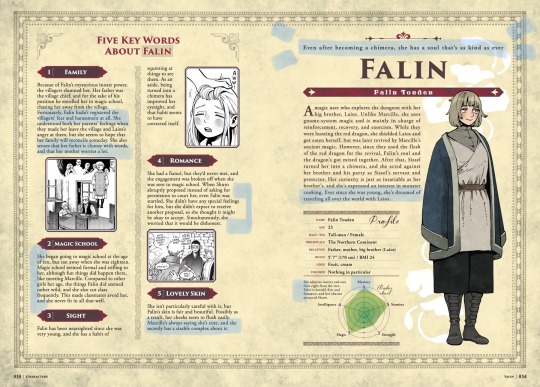
And awareness is a big analysis key word with Falin, especially here it can be hard not to conflate not caring with not knowing. How socially aware is she?
It’s rather layered, because canonically she wasn’t aware of her ostracization in her hometown at all, and we’re not sure if she knew Shuro was interested in her before he proposed, but she generally seems more socially aware than Laios. She tags along on his caravan job to make sure he isn’t being mistreated (though doesn’t ask he get a salary), she catches social faux-pas more easily like in the genderbend magic mirror omake with Shuro, and interestingly enough she’s very good at empathizing with her parents and understanding their perspective. We see when she’s worried about Marcille coming that she does know about propriety and how appearances shape impressions. Being a chief’s daughter must at least have taught her a thing or two on that front.
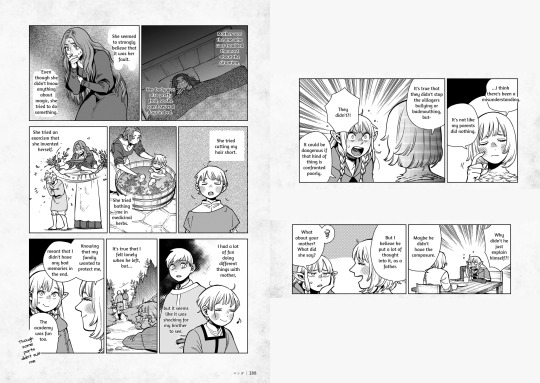
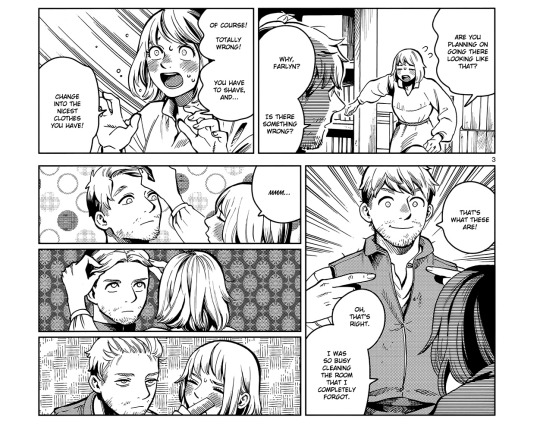
She never stands up for herself, but when it comes to defending others she worries, strategizes and explains.
And this sort of understanding is part of why I think she’d notice the expectations pushed onto her like I was saying earlier, notice how she makes people feel when she’s careless. But if she changes anything about herself in response to noticing is for her to choose, and generally I think it’s a sort of inbetween of yes and no: that she becomes more complacent but also more reserved, complying but by hiding more of herself passively. She’s not sure wether to accept or reject Shuro’s proposal, doesn’t want to lead him on? She’ll just be taking a while to silently consider it, try to keep things as they are for the time being. The third, less conflicting option. She doesn’t feel heard by Marcille who keeps infantilizing her? Just bear with it. Retract yourself emotionally. Settle for it.
We see that when she was young she had a tendency to not read a room, and I think that’s here too. She doesn’t get why her nonchalance upset others but that doesn’t change that she doesn’t want them upset or hurt, so she tries, albeit in maybe a roundabout way. She always had a hard time deeply connecting with people, often keeping herself some amount of emotionally distant: erasing herself from the equation, from the two-way trade that relationships are and making it a onesided thing instead, where all their needs and emotions are directed towards her but she only lets out a bit of her own show. She takes everything upon her and deals with it and tries not to give others this same burden, though not on a conscious level, it’s just that she’s learned growing up that she doesn’t have much agency.
Like I went into with my analysis linked at the beginning, I think Falin is used to just taking what she can get and not asking for more, when it comes to social bonds.
She’ll take spending time with her mother no matter what it is they do, she’ll follow Laios to the graveyards and stick by him even when he’s pushing her away (because he doesn’t want her borrowing his book or "No copying!" or such). Her father was always distant, cold and uncommunicative, her mother was considered sick from anxiety and the exorcism attempts were the main way they spent time together, at dinner tables there were only her and Laios.
The dogs picked on her too even if she loved them— And so did the townspeople, maybe that being normal to her at home is why she didn’t notice the ostracization she suffered.
She’s always been the last to be asked about decisions or what she wants, never asked to play with at recess, neither her father or Laios asked before sending her to the academy or leaving the village.
At home, in the hierarchy she was considered to be below the dogs by the dogs themselves, as someone they can disrespect. Dogs learn from example and behavior, so this means Falin must have been pushed around a lot, and that the family didn’t try hard to rectify the dogs’ misconception, likely worsened by Laios regularly wrestling with her as a competition.
So for example when Falin showed Marcille food, it was her way to implicitly ask to have lunch with her without voicing that question, without daring to take up space. Someone’s presence isn’t something you ask for, it’s something that’s bestowed upon you, you can follow them around but you can’t ask them to stay or to come with.
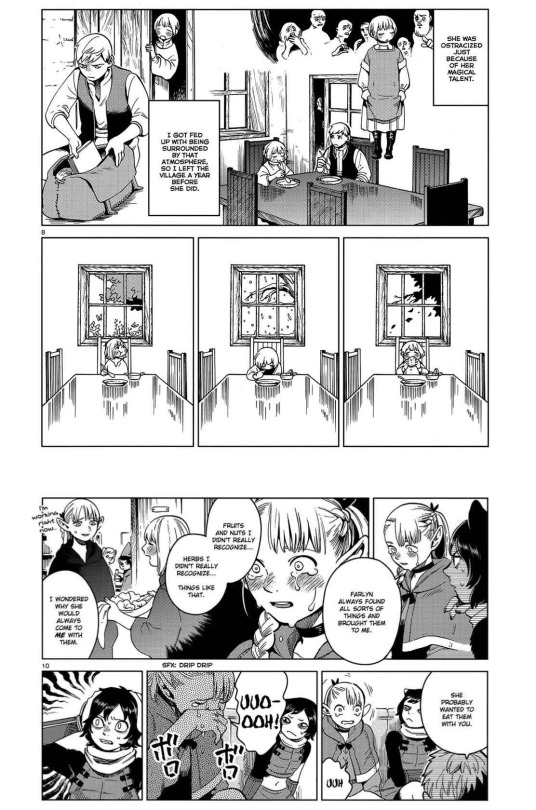
She’s used to her needs and wants not being listened to, so she’s learned to have less wants. Caring less about herself, caring less about other people beyond her safe zone, was a defense mechanism in part.
She has a sense of learned helplessness too, like how when Marcille came to take her away from Laios, even though she didn’t want to leave with Marcille it felt so determined and unshakable to her that whatever Marcille decided Falin would have to comply with.
And still, it’s the "marrying you would be awfully convenient if it wasn’t that I’d feel guilty for not loving you back, the way you wanted me to when you proposed to me" and the "I don’t regret leaving the academy and leaving you behind without goodbyes but I’m sorry that you’re so much more upset about it than me". It’s the guilt of not loving people back the way they want to be, with the same intensity or fervor.
It’s the autism it’s the aroace of it all, it’s the emotional stunting and confusion but the pit in your stomach telling you you did something wrong again. The no object permanence even for people you love even for 4 years, it’s the feeling like you’re somehow at fault for someone having fallen for you and not knowing what to do with any of it.
I’m not joking btw it isn’t uncommon for autistic people to not see their close friends for a long while, not having missed them all that much and for that to be really hurtful for the other if they notice/ask about it. "Hiii bestie! Oh umm you’re uh more emotional about this than I expected, hopefully you won’t feel alienated by me not feeling as intensely about it…"
So… Yeah. I think she thinks of things and relationships in a different way than most people, and beyond "good things happening to people is good" I don’t think she actually cares about people all that much. I’d argue that Laios shows more desire to connect with others and make relationships. And just like with Laios and his own issues with humans, that doesn’t mean her kindness is a lie or ungenuine or worthless!
It just means that like, well it’s pretty straightforward really, she’s not all that social and doesn’t see casual bonds as meaning all that much and whatnot. She does want to see people happy, but it’s not as much like… A conviction or goal. She’s too laser focused on a select few people. "It’s not that they’re bad people, they just aren’t interested in humans."
And sometimes it feels like people get defensive about Falin in a meta way too, like if you ever so much as imply Marcille isn’t her whole world or that she isn’t the kindest soul out there then you’re saying she doesn’t care at all or she’s evil. And that’s actualy exactly the sort of vibe I wanted to get through with my analysis above here actually haha, that she does care and she is kind but it’s not in a way that’s quantified or understood in a way that makes people feel comfortable. In a way, that makes people feel insecure because they don’t have the same logic as her, don’t show love the same.
And I think this is another stellar depiction of autism, of parts of it that feels unpalatable to many, if I’m making sense. The fandom idealizes her as well, which isn’t uncommon or surprising for the character embodying the trope of the perfect beloved to rescue.
And disclaimer, as I said in the tags I feel like the details of Falin are pretty vibe based when it comes to analysis, there’s absolutely a valid angle where she does super care about everyone always, feel free to disagree with me on the overarching angle of my analysis. There’s enough supporting evidence to tip the balance either way I think, and the reason I’ve chosen this angle is I feel it’s more compelling for the themes in Dunmeshi of idealization and being different, of desires vs wants, and because I think it neatly ties up Falin’s character arc as I’ll go over throughout the next section…
So.
Not feeling as much as she should. And……. Is this not Faligon pushed to the max?
You can’t tie down a dragon. As the chimera, she gets to just not care about everyone else and be on her merry way.
Part of it I think is finding comfort and freedom in the mindlessness, in not having the burden of feelings and connections and a consciousness (despite still ending up seeking those in a stranger, Thistle).
Like when she’s dead in the purgatory as well, she gets to just… Hang around and do whatever. Similarly to when she played in the forest instead of going to class in her academy days. That’s what freedom and peace of mind looks like to her. Why she decides to roam post-canon, if only now with the goal to find herself instead, with her mind in tow and somewhere to go back home to.
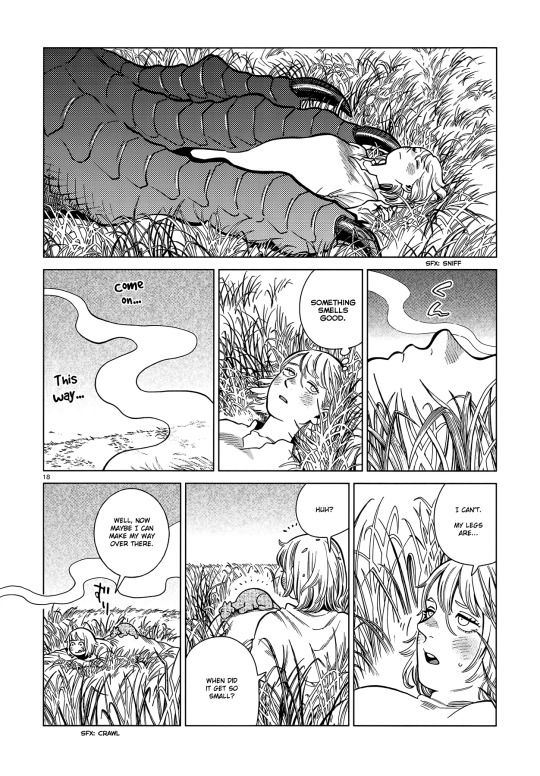
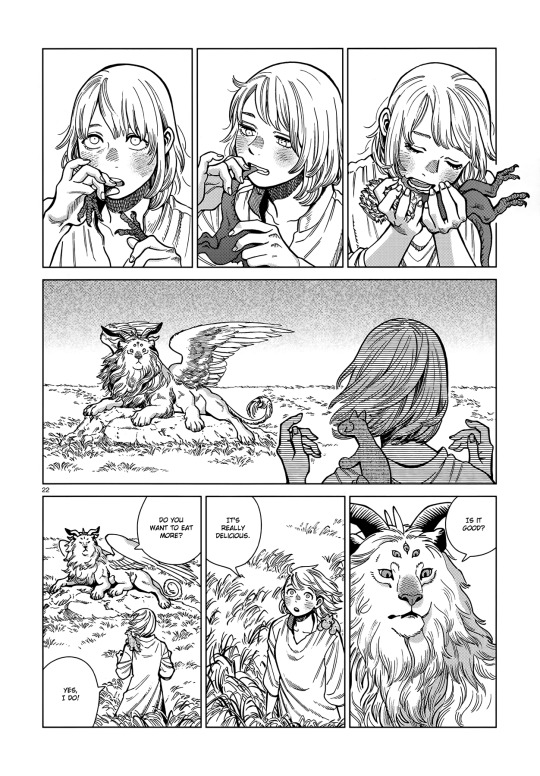
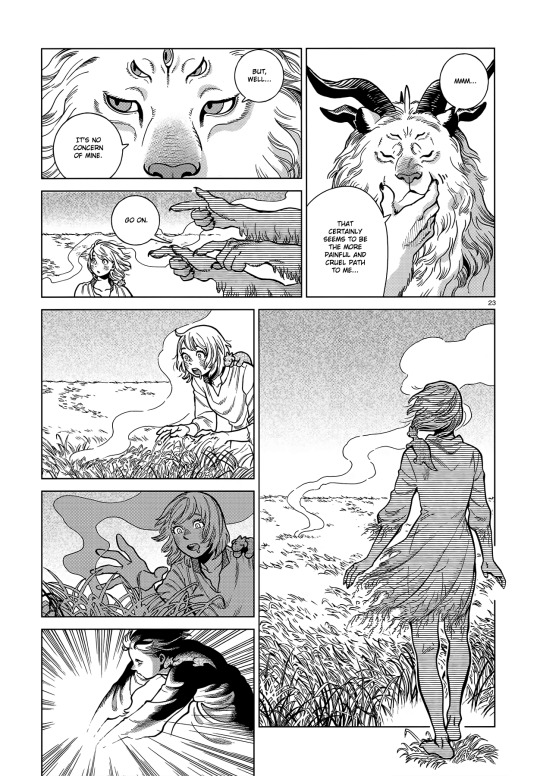
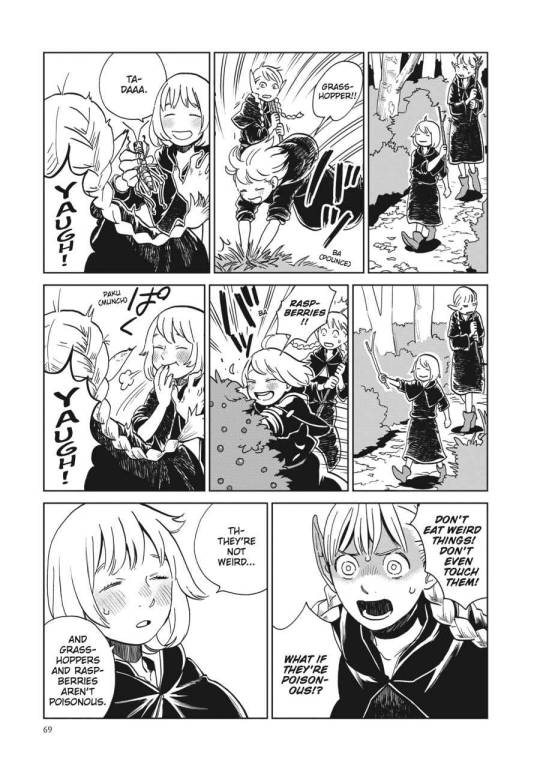
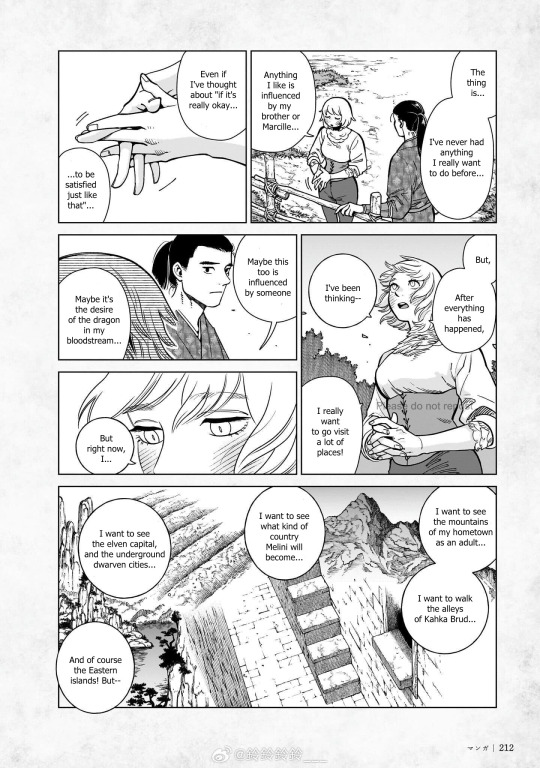
There’s excellent analytic framing out there about how of course, Dungeon Meshi has a big theme of grief and letting go, and… Falin was always a symbol narratively, idealized by characters and often underconsidered by them despite their love. It was Falin’s choice to sacrifice herself for Laios, she thought it was worth it, knowing that it would be her end. Her resurrection and the process of it intertwining her soul with a dragon’s wasn’t done with her consent, and the subsequent opening it gave her to become a chimera puppet. She’s stripped of her agency consistently, and so… It’s very noteworthy that the final choice, of wether to go back to life or to stay dead, in that purgatory scene, was up to her. And she chooses life, but I do think about her in those fields and how at home she seemed there. Peaceful, by herself in a vast calm expanse she could explore, free.
Personally, I think freedom is Falin’s own subconscious selfish desire. And though to us becoming the chimera is obviously a shackle, I think it felt like freedom to her somewhat, too.
And if you think I’m going wildly off the rails here I want to talk about Laios’ wish of becoming a monster.
And to be clear before getting into it, being mentally a monster is absolutely a big part of the appeal for Laios, it’s something that’s consistently referred to, something especially pointed out in the werewolf monster tidbit with Lycion. Right panel is from that, but left panel is from the extra with Izutsumi where Lycion talks about suppressing souls in a beastkin body, the human or the beast soul.
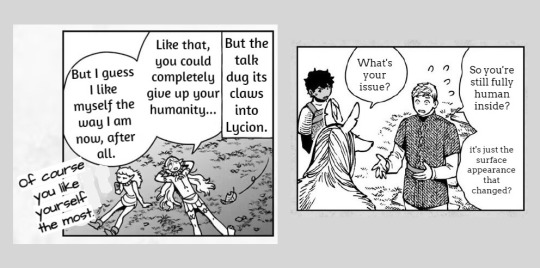
Finding comfort and freedom in being mindless, less sentient, less aware? While being unaware in her hometown might have saved Falin a lot of heartache although perhaps stunted her emotional growth, it’s always been Laios’ curse.
Actively, through his choices, he seeks to grow closer to people, to form deeper bonds, to understand and be undertood, but… On a deep seated level, what he desires is to leave humanity and civilization behind. He has an irrational hatred for humans, born from the trauma of ostracization, being different, being beaten up and rejected consistently through his life. Running away from problems is easier. He wants to be free from being a social animal from a social species who has deemed him the black sheep, he thinks it’d be simpler to just leave it all behind, people and his own humanity.
At its core, to Laios becoming a monster is a power fantasy, a coping daydream of "if only I could be strong enough to never be hurt again, the power to destroy anything I want, the power to go somewhere better, if only it was possible for me to never feel hurt again. If only I could be someone, something, that can never be hurt". "If there’s someone you don’t like, you can gobble ‘em up in one bite. If you could fly, you’d be able to leave this village right now." It’s a childhood fantasy, from a deep sense of being misplaced and a desire to be able to stand fearless, thinly covering up resentment that Laios represses.
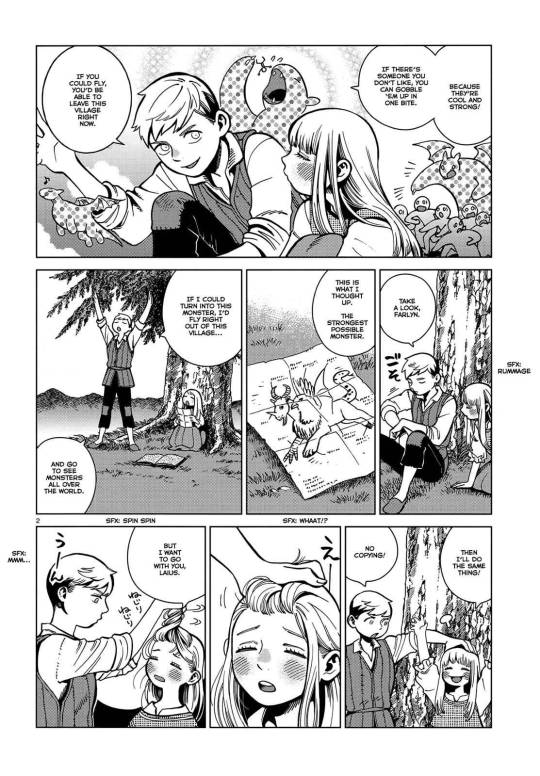
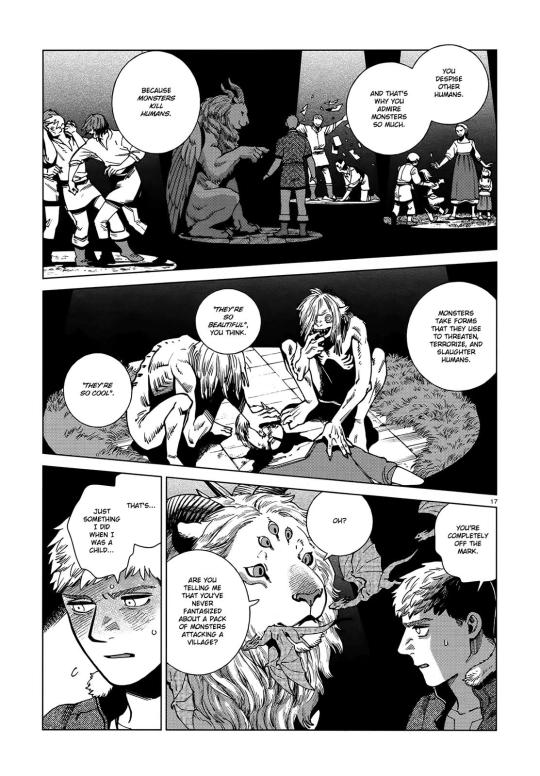
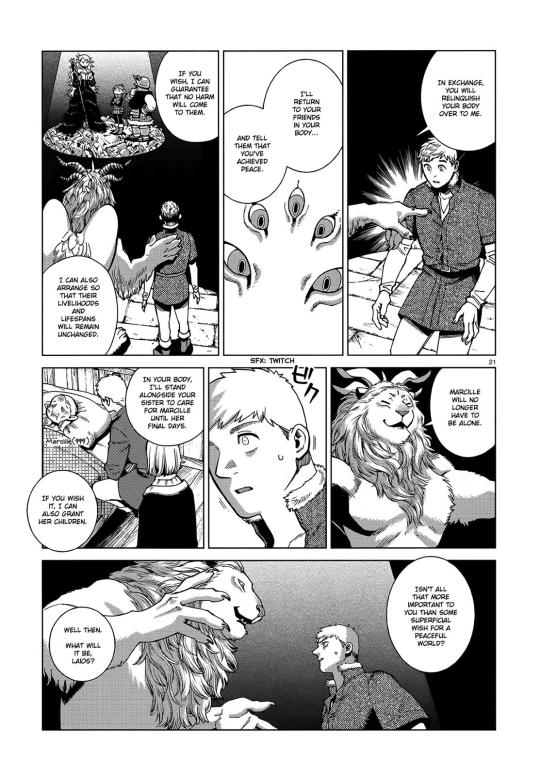
But you’ll notice, when the Winged Lion is enticing him in the last page, even now with his lifelong wish of becoming a monster on a silver plate, he still cares about his friends. He still has that sense of responsibility to his friends, doesn’t want to leave knowing they’ll be in danger and alone. The offer that his friends may be left unharmed is already good, but Laios also visibly flinches when the Winged Lion offers to specifically care after Marcille and rid her of her biggest fear. Laios’ care runs that deep. Not unlike with the succubus, he resists temptation until he gets reassured that everyone will be okay. But see, what he desires isn’t to stand alongside Marcille until her last days, it isn’t to stay and see how well his friends will live, it’s to go. It’s to leave. It’s to fly away, a monster both in body and mind. He wants to be free from caring here, wants to not have to worry about his friends, wants to just go do his own thing, but for that he needs to feel safe in the belief that said friends will be safe even without him being there to see it, because despite everything else he cares, he does. It’s again that dichotomy about caring and wishing you didn’t, or not caring and wishing you did.
In the end, it’s Falin who achieves that wish. Both by becoming a chimera during canon, and by going traveling post-canon. In the latter, being both free of human relationships as something chaining you while still being uplifted by them, by the knowledge that there are people out there you love and that love you.
It’s a theme that can also be connected with Marcille, because she gets anxious over people she loves getting out of her sight, worrying they’ll get themselves killed, that time is passing while they’re away from her.
But before she can get to the point where she can both have her freedom and being uplifted by her social bonds, regaining both her individuality and her connections, she has to get a taste of just one at a time. Before they can find balance in her life, she has to see what it’s like to have what she’s never had on its own. Unapologetic freedom, and power.
No one can blame you for not caring enough or caring right if you’re a fricking dragon!!!! You make the rules when you’re a beast and you can just… Fly away. From anywhere, from anything. And if a dog bites you you can just crush it. Instead of being pushed around by the dogs because you’re at the bottom of the hierarchy, you’re now at the top, the one with the power to be heard and do what you want without consequences.
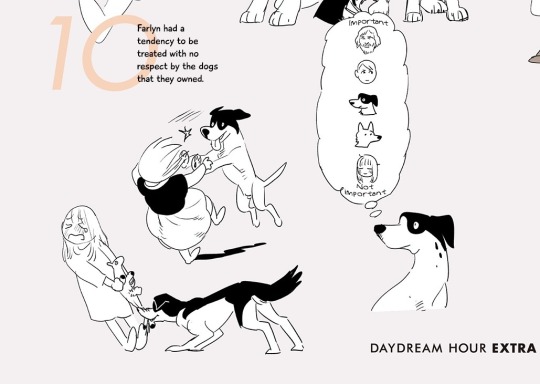
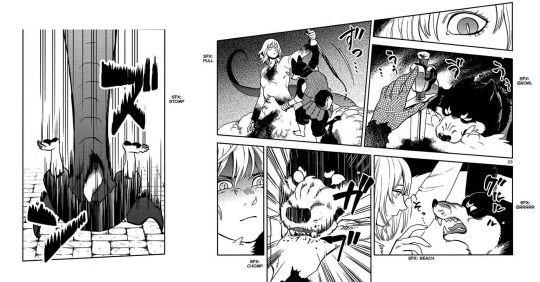
I think she’s on autopilot. I think she’s on autopilot a lot of the time, even before being a chimera, and it’s partly why her will is so weak compared to regular dragons. (Again, read my shorter analysis.) It’s familiar to slip back into the role of following someone around unquestioningly. And that’s what is weaponized when she’s a chimera, that instinct she’s been nursing all her life to unconditionally support, defend and follow someone.
Only now, that someone doesn’t matter in itself, only the symbol of it. She doesn’t mind, either way is fine. Her will is weak after all, because she’s trained it to take as little place as it could.
Falin cares too much
She spends all her time caring for Laios and Marcille alternating that none of her care and emotional energy is left for others, including herself. So she had to get relieved of all of that for a bit, becoming the chimera so she could reset and recenter and remember that she, too, indeed, is there and an important part of her own life.
So you’re probably seeing the duality I’m talking about here, Falin is very self-sacrificial but for specific people in ways that they often don’t recognize or appreciate. She cares but selectively, both in people, putting all her eggs in the same baskets, and in the ways she cares after them. She doesn’t care a lot, but when she does she cares a lot. Falin doesn't have a lot of earthly attachments, but when she does, they're her world.
In canon her arc, especially post-canon, is to grow beyond Marcille and Laios. Her caring for her close loved ones held her back from looking after her own self-fulfillment needs. And this is what I mean when I say she cares too much; she could gain from caring more about the world besides Laios and Marcille, both lands wise and people wise. She cares too little, but her arc centers her flaw around caring too much instead.
Her pitfalls that Kui highlight over the course of the story, while of course her selflessness is appreciated for how she saved Laios and everyone, on a personal level is shown to be self-effacing and damaging. She’s undermined by Marcille, without the courage to voice her thoughts and wants, she would dedicate her whole life to Laios. And I mean, it’s text, in the response to Shuro’s proposal extra no less. And she’s so laser focused on her most loved people that she’s fine with being callous and risking others’ lives, even.
Post-canon, she needs to leave to find herself, away from them.
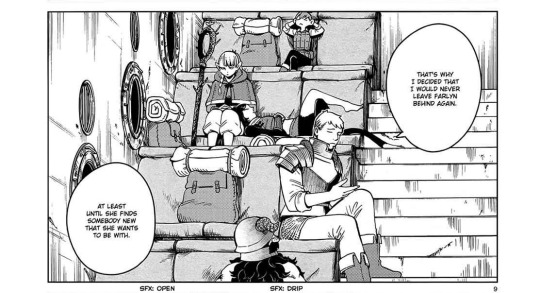
Herself. What if she wants to just be with herself for a while.
And this is me reaching but I feel like, not unlike Izutsumi who learns to feel this sense of never being alone, always having someone on your side what with having two souls, the dragon in her would make her consider herself more. She finds it easier to care after other people after all, and in the purgatory fields sequence she takes care to bring the bit of dragon left with her… Not unlike with Izutsumi, having two souls forces you to think about your identity and figure yourself out.
Besides being this sort of duo now, where if she wants to care after herself she can channel it to that other side of her too… In meta dragons are symbols of greed, and I think the bit of dragon would push her to want more and listen more to her desires, primal and self-serving as they might be. The dragon soul which warped her human body with feathers and draconic features, her image of perfection marred, her weirdness externalized in a way that’s not palatable. But she doesn’t care, about if her appearance is palatable for most people, she hasn’t for a while now, and that’s great.
Notes & nuance
I’m struggling with the structure of this post, making my points organized, concise and strong at once. It’s difficult to make any statement without going "things are generally like this, but there’s this time that this contradicting thing happened too" or "it’s ambiguous enough that you should just follow my interpretation for the time of this analysis" haha, so this is the pit where I put all the stuff that wouldn’t fit well in other places but are interesting for Falin’s character. This section is pretty separate from the main thesis of the post, it’s just more Falin observations.
The post has reached the 30 pics limit so I can’t just pull it up whenever it’s relevant but I really encourage scrolling up to read the stuff I highlighted in her Adventurer’s Bible profile if you haven’t already.
I think with the shy-looking loner type autistic kid archetype, and knowing she didn’t seem to mind others ostracizing her, it’s easy to lose sight of how she was by no means an unemotional child. In all the bits we see of her as a kid she’s bursting with energy and emotions. Canon confirms Laios leaving the village did affect her and make her lonely and she cried a lot, too.
She may not be social in the traditional sense, but she was clingy with her brother, and she also never was all that shy about who she was, wearing her heart on her sleeve.And okay. Okay okay okay. Speaking of appearances. About what I said of her not caring about what people think of her, even seeming defiant with the caravan leader… There’s one istanxe of her caring actually, and it’s about how her face blushes easily. I remembered it as being because Laios’ said it and as I rambled Laios’ words are her world, but actually it’s ambiguous. It’s only Marcille imagining up this scenario where Laios says Falin looks weird because of it, there’s no evidence Laios said or thought that at any point. And on the other hand…
Her Adventurer’s Bible says: "5, Lovely Skin. She isn't particularly careful with it, but Falin's skin is fair and beautiful. Possibly as a result, her cheeks seem to flush easily. Marcille's always saying she's cute, and she secretly has a sizable complex about it."
The phrasing makes me think the complex she has over her blushing might have developed because of Marcille more than Laios. "Marcille's always saying she's cute, and she secretly has a sizable complex about it." It could be related to how Marcille gets swept away and infantilizes her, calling her cute wanting her to wear cute feminine outfits etc. Again this feels like it relates to Falin’s struggle to be seen for who she is and what she wants to be seen as, her struggle to be recognized, having ideals and perspectives pushed onto her. Here Falin is insecure over her blushing implicitly because she doesn’t like being called cute over it, but that’s not how she wants people to see her. She doesn’t want Marcille to always see her as her 10 years old adorable friend. Like if your friend said you had puppy energy, it can be flattering, but it can also make you insecure.
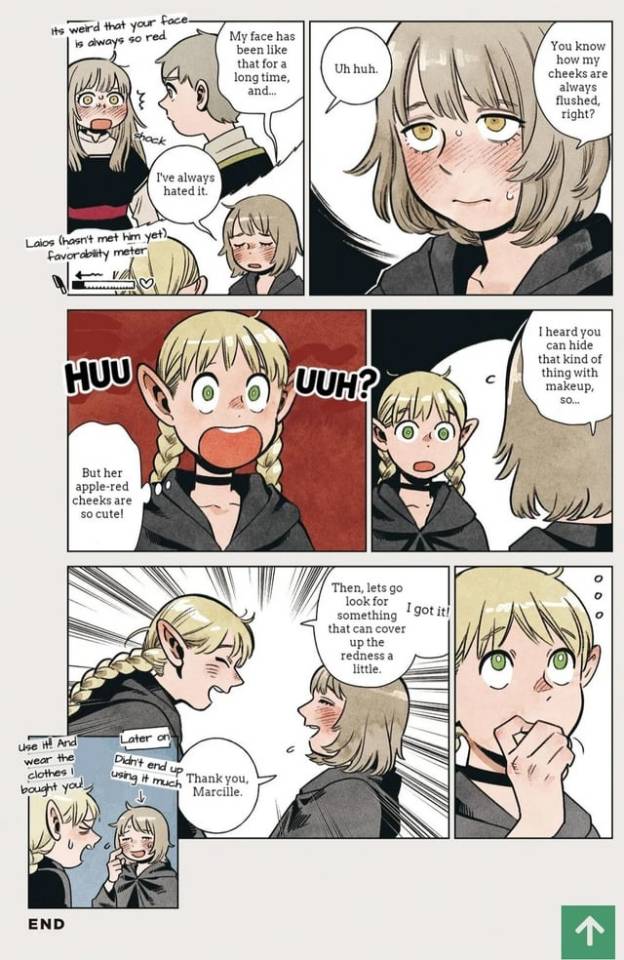
Here’s a link to what I mentioned about her being uncomfortable wearing feminine outfits. It does seem to be more about comfort than the aesthetic perse, to me. Interestingly the shirt & shorts don’t seem like they show much more skin than her beach outfit, so maybe it’s more about the shirt and shorts being tight-fitting. Like the skirts and heels they feel stifling. Again a bit with themes of freedom and not wanting an aesthetic pushed onto her.
So yes just to reiterate, I think this is more about self-affirmation and how her identity and self-image gets shown to others, rather than wishing to hide parts of her body like her blushing etc for people pleasing reasons. Makeup was a way for her to appear how she wants to and feel more confident. It was a way to take control over her own image.
She didn’t keep doing it, the narrator stating the process to be ‘troublesome’. Ultimately she still prioritizes her comfort, and it was a lot of recurring efforts to go through.
And on the topic of appearances… A friend once asked me: "Does she really hide herself or not? I keep thinking about "falin is herself first and foremost" (in her Adventurer’s Bible profile) it’s just so. Hmmmmmmmm... I just keep seeing people say she hides her real self from people when I feel like the issue is more about her charitable traits straying too far into becoming flaws but people around her dont realize that..."
Imo the thing is, I don’t think she hides her identity, but I do think she suppresses her individuality for others’ sakes if that makes sense. In the way that only post-canon does she allows herself to go see what the world is like, but that’s not personality wise it’s needs and wants wise.
And I do feel like that’s the closest interpretation of canon, she says it herself she doesn’t know what she wants because everything she’s done was always about Laios or Marcille, but she doesn’t change her demeanor or personality for others. But she *will*, like, not ask for things she wants directly, like sharing lunches with Marcille at the academy, she suppresses her wants, doesn’t ask things from people and doesn’t hope for more, hope for better. I don’t think we ever see her actively repress her personality, except like what, being more laidback than enthusiastic but I do feel like unlike Laios with her it’s less ‘appearing stoic to fit in more’ and more ‘yeah i’ll just chill until I’m needed or something activates my enthusiasm’.
To which said friend quoted: "to feel like you belong you need to be useful. when you can’t be useful the next best thing is being convenient."
And speaking of passivity… I want to speculate about Shuro’s proposal some more. Shuro and her got along well though we don’t know how much, or how often they hung out, she even saved him from a nightmare.
Why did she take so long answering Shuro’s proposal? Was it an effort to preserve or was she really just that conflicted? Procrastination probably yes, but what is the core motivation of itl Considering she ended up saying no to travel the world instead, I don’t think it was as simple as ‘she wanted to say yes for convenience’. Logically it’s what would have been best, but it’s not what she wanted for herself, but it was and still is hard for her to even know what she wants. Probably, since like she states it was a great offer and she doesn’t think she’ll get proposed to again, it’s that self-effacing tendency that yes it’d be convenient and logical, and that makes her want to say yes even if her spirit isn’t in it, because if it’s convenient then that’s more important than her feelings on the matter.
Man also… Obviously Marcille is very vocal about how she shouldn’t get with Shuro, but imagine how Falin’s whole perspective on marriage must have felt when her only friend ever is a Romantic with a capital R who gushes about idealized romances and grand gestures and True Love and doing things with fully pure feelings all the time.
AND speaking of passivity!!! How much Falin is "there" as the chimera, just how much she’s master of her actions, is left ambiguous and intentionally so imo, but she’s for sure there & influencing the dragon’s action to some degree. Having a dragon’s foot on her in purgatory that keeps her from moving for sure visualizes how it must have been like, but there’s Falin calling out to her brother Laios, there’s the kind attentions towards Thistle that are so Falin-like, and most explicitly there’s the Adventurer’s Bible stating "Even after becoming a chimera, she has a soul that's as kind as ever", which I honestly dislike, a fantranslation puts it as "Even as the chimera, her caring nature remains" and either way to me it feels like confirmation that it’s her giving those berries to Thistle. Now, wether or not she has the mental capacity of a chicken or something closer to human Falin, no clue, there has to at least be some kind of mind bond between monsters and the dungeon lord, compelling or forcing them to go along with orders, or calling her to him in distress like with the fight on the first floor. But yes, it’s interesting to wonder what it is that a Falin, with her kind soul but without her human mind, would willingly do.
On her profile, she’s described as Thistle’s guardian and servant. The power dynamic between the two are very interesting, I already went into how it might have felt like freedom to her while being fake so I’ll reign myself in and just mention it again. She’s still at the heel of someone, only now it’s someone who doesn’t care about her back. Going from being cared for so strongly that it’s suffocating and they would defy death and the world for you, to being devoted to someone who has not one feeling about you besides your utility as a paw . She has all this care to give and to focus onto others and he has none to send back to her and I think that’s part of it. In a way, being left with only her own feelings and a void, without expectations or feelings or ideals pushed onto her, it might have been soothing in itself, and eye opening. But yes the way I think of it, her care for Thistle isn’t unlike the care she gives the ghosts.
Interestingly, the care she extends for the ghosts is sending their soul to a peaceful death, freeing them, of life and any earthly attachment. Take that as you will with the themes of freedom and burden of life and mind, immortality and becoming a warped version of who you were, and such and such.
But going back on the topic of connections and bonds for a bit, I think academy days Falin & Marcille is super interesting bc we’ve never really see Falin form a connection besides with Marcille and even that is kept pretty ambiguous. When was the point that Falin started seeing Marcille as a friend and seeking her out? When was the "I’ll lay down my life for you" point? I’m so fascinated by how she wanted to share lunches with Marcille but never truly asked, only made little "hey want this? I found it isn’t it cool?" gestures of showing things to her… It’s the only way she knows to ask, or maybe it’s the only way she feels comfortable to. In all the scenes of young Falin and Marcille Falin seems comfortable in her friendship with Marcille, but at the same time… I think we see Falin at her most insecure around Marcille, because she really does care about Marcille and what she thinks of her so much, and while Marcille is a bit of an unstoppable force tornado style (affectionate) Falin is something of a doormat. I’d usually say showing her berries was her earnest way to connect and be like "Hey bestie look at this! :]" , but there’s a real possibility that she was self-conscious and holding herself back.
Friendship and Marcille! Involving Laios into this too but, again with the autism thing of not showing you care in ways that others understand, Marcille being very overtly affectionate and clingy was so so soo important… Marcille keeping on hanging out with Falin and caring after her, and being undeterred/unbothered by Falin not always seeming like she cares all that much back in the conventional way, as in Falin acts nonchalant and a bit like she didn’t mind wether she was there with her or not during her outings to the cave dungeon. Caring and being clingy and so affectionate despite that in such a classic Marcille way is soo needed, because so often people will get discouraged by say, their friend not keeping in contact regularly/well, seeming disaffected or as happy-go-lucky as ever even if you haven’t seen each other in a while or when they’re alone, and yes there’s potential for a strong friendship there but someone like Falin won’t be committed enough to reciprocating attention the same way… I hope I’m making sense but yes this angle in particular strongly correlates to autism. And the way Marcille always initiates physical affection, both Toudens being awkward about initiating touch because they don’t know if that’s allowed, if they’re going about the social interaction the right way, if they’re allowed to ask that out of someone…
Another fun observation to make is about the 4 years Falin and Marcille spent apart. Marcille despite being of a long-lived race treated these 4 years of separation with more gravity than Falin did. Falin brushed it off very dismissively to say the least. But then you remember that the amount of time Falin and Laios didn’t see each other after he left the village was 8 years. Double the years, double the time. And that reminder makes Falin’s actions so starkingly understandable. Of course she wouldn’t see 4 years of separation as a long time if 8 years of separation with her beloved brother is her point of comparison. Of course she’d see it as worth it to leave Marcille for 4 years if it meant ending those 8 years instead, especially if she was worried about him (the reason why she followed him into his caravan job).
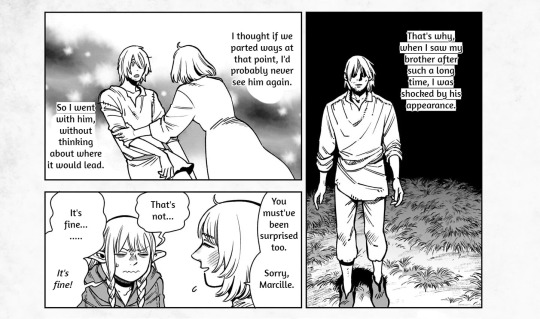
A friend always says that while Falin is the center of Marcille’s world, Laios’ is at the center of Falin’s, and I tend to agree.
It’s fun to think of how her career dreams had always been shaped by Laios, even when they were kids. Of course there’s how traveling the world began as a dream they talked about and shared, but there’s how he reassures her by listing cool jobs she could do like traveling exorcist, etc. And then of course, she gave up on her magic academy and career path to follow him and do odd jobs, etc etc.
I should go into the violence of Faligon more tbh, because I think there’s an interesting parallel to how she has no problem wacking things with a mace, wether a ghost when she was a kid or a walking mushroom as an adult. Something that often surprises fans when they remember, I don’t really want to get into the whole "
Falin hates violence and hates seeing people in pain to an intense degree. ‘If you die do it somewhere where I can’t see’ style’ interpretation, it has some weight but on the whole I don’t vibe with the theory she has a particular aversion to violence, she seems to be fine resorting to it as much as any other adventurer as long as it isn’t needlessly against ghosts.
And Falin’s sudden mace hits are fun to me too because it’s not her becoming a berserker when the need arises as much as her becoming active because something she cares about is threatened, and that brings her out of her passivity from 99% of the rest of the time. Thistle included. Falin always could be violent, she just dislikes senseless carnage. The Shuro party vs chimera fight is a bit ambiguous on it, because you can argue she only attached after being provoked, presumably offscreen as well while the ninjas went off to fight the harpies.
Falin becomes the most active when she needs to protect someone, she has no qualms doing whatever’s needed for that, wether it be leaving the academy & Marcille without notice no matter the consequences or what her parents think, or teleporting the party, etc.
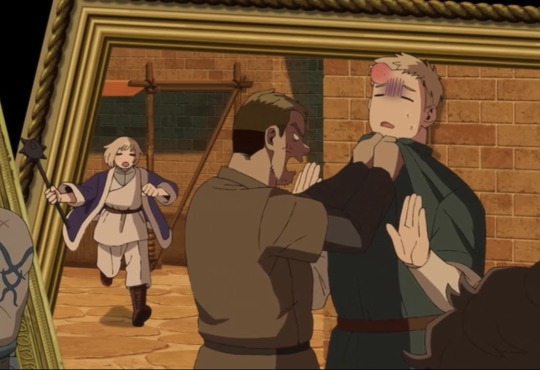
I’m working on a post specifically pointing out all the differences between Falin and Laios, but yes I think both of them selfishly desire freedom in different yet similar ways. Falin’s dark secret is "Ethics and risks are optional if it means I can protect those I love" like the teleportation, and Laios’ is "Ethics and risks are optional if I can be free of all this bullshit" aka humanity aka his wish with the winged lion.
Conclusion
Flighted birds have hollow bones. With freedom and wings there comes risks and sacrifices.
Tldr:
Falin doesn’t care all that much, she’s very go with the flow. For example if someone hates her she doesn’t really care because that’d require her caring about what they think of her in the first place, and she only cares about her loved ones. She smiles, but it’s more a state of being rather than out of active goodness: she’s canonically very genuinely kind, but it’s more out of a general want for pleasantness than active care itself. She’s passive, and softspoken because that’s just how she seems, but she has no problem hopping into bushes or getting heated if something calls to her enthusiasm or calls for action and a hit of the ol’ mace. Her loved ones needing tending or protective is what makes her go from passive to active. That familiar autopilot mode of making someone the center of her world and following their every move is what made her so easy to be controlled as the chimera, even ferociously defending him with her life.
Faligon is most interesting to me with the theme of freedom. She’s shackled to Thistle and out of her mind, but there’s also a sense of empowerment and freedom from expectations and society.
She spends all her time caring for Laios and Marcille alternating that none of her care and emotional energy is left for others, including herself. So she had to get relieved of all of that for a bit, becoming the chimera so she could reset and recenter and remember that she, too, indeed, is there and an important part of her own life.
There’s a way of caring after others that can be selfish, not unlike Marcille being overly coddling and not listening to Falin. In Falin’s case, I think it was so selfless that it ended up looping back around to erasing her sense of self. In losing sight of herself, that devotion becoming neither quite selfish or selfless but a fact of life and a state of nature, muddled by its lack of direction.
She’s sooo used to never being able to ask things out of others, you get the crumbs of affection and approval that others offer to you unprompted and that’s it don’t hope for more don’t ask for more. (Also reflected in how she follows her loved ones around without complain or personal opinions and how she’s not willing to rock the boat and affirm herself in her relationships like with Marcille during canon)
Falin cares so much, so much and so laser focused on her few loved ones that it blinds her and she loses sight of everything else, she ends up neglecting herself and the rest of the world. As Kui puts it, Falin is herself first and foremost. She just had to remember the importance of that.
-
I see her as an enneagram 9, which can be surprisingly accurate and fun to research through the lense of Falin. Excerpt below from this book, but like my god, good way to put it
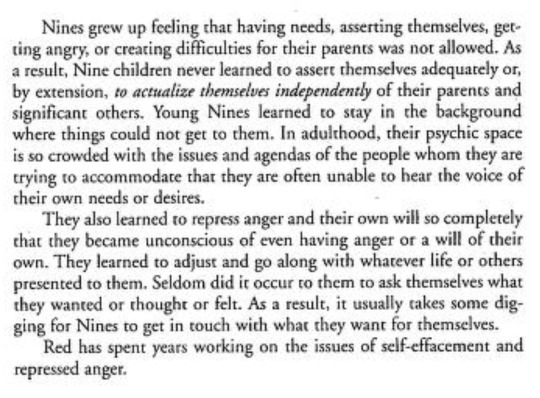
That’s it, ty for reading. Even if it’s a bit of a mess, hopefully you’ll have gained a thing or two from it. Falin is a character hard to pin down, but it is very gratifying when you find the way that the puzzle pieces fit together right for your own understanding of the story.
Fantranslation of the shuro proposal comic by @/thatsmimi here.
Here’s my spotify playlist for her if you’d like
Sometimes love is about letting go, a lesson a lot of the cast needed to learn. Self-love’s important too, and just like with diets we need a healthy balance.
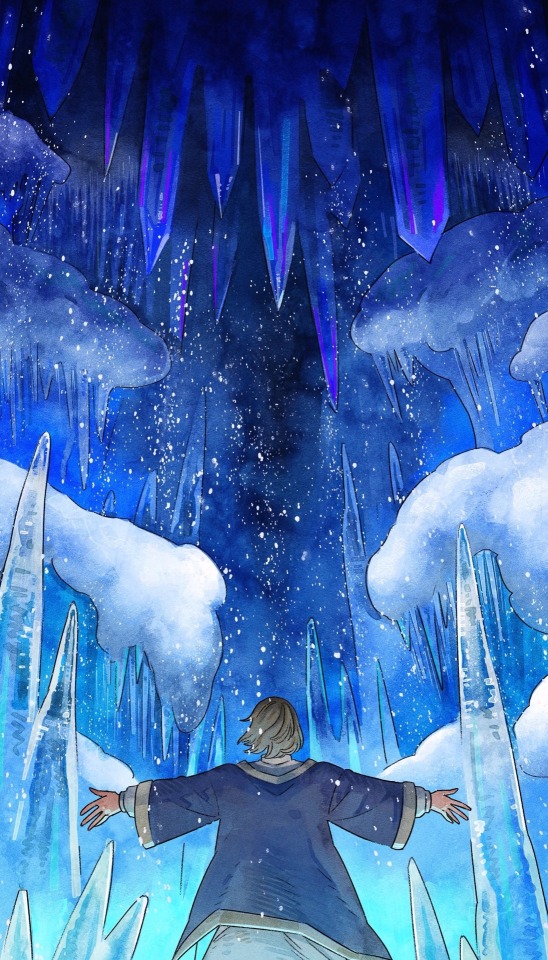
#I find it hard to express myself right on the topic of Falin. Both because the issue is pretty vibe based and because we don’t#get that many moments with her. So there’s ambiguous scenes up to interpretation addressing a layered topic and like. Save me. Save me#As always falling down the rabbithole of starting an analysis about a specific facet and then needing to explain everything else around it#I’m doomed. I’m getting lost in the sauce.#dungeon meshi#delicious in dungeon#falin touden#analysis#character analysis#meta#autistic reading#aroace reading as well. Sort of. It’s mentioned#The aroace autistic guilt of not caring back in the way/with the intensity you’re expected to#As always this is just my interpretation blablabla#Spoilers#dungeon meshi manga spoilers#She loves like a dog aka unconditionally and happy with eating scraps of affection and attention off the floor#Laios touden#he’s here too bc they are an unit#If you’re not capitalizing on the uncanny vibe autistic effect for Falin’s character u are missing an opportunity imo#Fairy’s child is written all over her. Her cryptic-ness is the point so why am I surprised she’s hard to fully pin down#Even with the graveyard scene it was Falin following Laios… Sob. Laios could feel responsible her powers were found out#I’d like to rework this at some point if i get better at structuring. I’m not satisfied by the level of clarity#Will 90% for sure edit stuff in if i find more to say.#Fumi rambles#Crazy style#I give a TLDR at the end if you’d prefer. It doesn’t have the like evidence/explanations alongside but it makes the main points i think
1K notes
·
View notes
Text
Ideology of Exceptionalism and Gravity Falls; meta and character analysis

I had a whole ago read a post by @icanlife that had a quote by Alex Hirsch on Ford's greatest flaw, and wanted to explore what the flaw is, which is the ideology of exceptionalism; in the exploration, I’ll touch on what it is and how it is used in abusive relationships and cults, as well as how it drives multiple Gravity Falls characters and consequently how it impacts relationships between these characters, and how the show ultimately refutes exceptionalism.
Quick note here; I am not in any way, shape or form a psychologist nor have any formal training in psychology; this is written from my own experiences with this ideology and my own forays into psychology and trauma-informed learning. It is also written with a loose understanding that is likely not broad enough to cover all references to cults, extremist groups and abusive relationships.
The Ideology of Exceptionalism
First of all, we have to get through a drier bit, which is… what is the ideology of exceptionalism and how does it arise? Might be fairly obvious, but it is the belief that you are, or belong to, a group of exceptional people, thus more important and worth more than anyone else; ie, those who don't qualify as 'exceptional'. It is often a subconsciously learned ideology. Now, what qualifies one as exceptional can be extremely varied; generally it revolves around something that provides some form of privilege. Thus, it might be, as the main exceptionalist idea in Gravity Falls, 'intelligence', or power, or it can be such things as attractiveness, quantity of money one has, species, nationality, or skin colour and ancestral heritage. The ideology of exceptionalism, being by nature hierarchical, devalues, and at its worst, openly and violently dehumanizes those who do not qualify as exceptional.
For why exceptionalism occurs is an extremely broad topic, but I've personally found that, for exceptionalism revolving around intelligence, it's a result of a poor sense of self-worth, and having one's self-worth tied to what makes one exceptional. Poor self-worth itself (again, broadly) is a result of childhood trauma from a lack of positive affirmation and unfulfillment of the emotional needs of the child. Meanwhile, self-worth becoming tied to the quality of exceptionalism generally is a result of when positive affirmation was pretty much solely provided around their 'exceptionalism', especially when provided derogatory commentary, or a blatant example of how they would be treated if they aren't 'exceptional'. As a result of the general lack of affirmation, self-worth then becomes often solely reliant on the qualities of exceptionalism, as that is the only way for the child (and later, adult) to get affirmation of their worth, as well as out of fear of being ‘not worth anything’ like the examples of ‘non-exceptional’ people they have been given.
This is especially likely to occur when the child is a social outcast; the adoption of the hierarchical ideology of exceptionalism, and the devaluation/dehumanization of others often occurs subconsciously as an avoidance/minimization tactic from pain. This is to say, the child, and later the adult (if healthy self-worth is not established) goes 'it doesn't matter what the non-exceptional people say or if they accept me since I matter more than them because of my exceptionality'. It can even be taken further, that being shunned is part of one's exceptionalism, and becomes part of the qualifier of being exceptional. For instance, 'they just can't understand because they aren't exceptional and that's just a part of being exceptional'. This idea also neatly tailors into the part of the concept of being better then others means you are separate from others; this can be taken that someone who is special, needs to be alone to be truly special.
Obviously, exceptionalism is not a healthy coping mechanism for poor self-worth, as often such people constantly feel the need to prove and show off their exceptionalism to gain that affirmation and avoid rejection, which is stressful. As well, it often negatively impacts their relationships with other people as a result of the arrogance of believing that they are better than most others, or even deliberate sabotage due to their arrogance. This occurs as they flatten the complexity of human experience to black-and-white hierarchical categories of exceptional/not-exceptional through constant judgement of those they meet, and often refuse to engage with people who don't belong to their 'exceptionality', or even people they simply don't like, even if they technically qualify. Generally, those that they do like or have close relationships with, often due to being similar, are automatically labelled as 'exceptional'. Those judged as ‘exceptional’ also become privy to the open judgements of ‘non-exceptional’ others, out of a subconscious belief by the exceptionalist that the other believes similarly; something that may strain their relationship if the other doesn’t ascribe to exceptionalism. This all culminates in the exceptionalist being blind or even adverse to the diversity of experiences, which makes it difficult to create relationships and community outside of echo chambers of their own beliefs (if they can even find this), and subsequently, these people are often isolated and have very few to no close relationships with people.
However, all humans require connections with other people, relationships where one can rely on others emotionally and physically if needed and feel accepted; they also require to feel like they are worth something, that their life has meaning. Lacking meaningful connections and having a crippled sense of self-worth, a deep yearning hole is left in these people. Exceptionalism, especially as it is a narrative constantly pushed by Western society as it validates hierarchies, is then employed as a (often subconscious) trauma response to assuage this yearning hole, with arrogance and denial. And depending on the circumstances, it can be a very strong and definitive trauma response for people.
This isolation and lack of self-worth is catnip to abusive relationships, including cults and extremist groups. These types of relationships often heavily rely on isolating their victims or pulling them into echo chambers of solely the abuser’s rhetoric, to redefine what is healthy through gaslighting; as the exceptionalists are already isolated, this makes them extremely susceptible. They also often provide these people affirmation, and in these cases especially about their exceptionalism, thus confirming their self-worth, their 'specialness', while also providing them the connection they have been lacking, either through the cult community or through the abuser’s own presence. These emotional needs, which haven’t been met in a long time, if ever, begin to be fulfilled; something that abusive relationships and cults hinge on, rather than any form of logic.
Ideology of Exceptionalism and Gravity Falls
The main characters within Gravity Falls which are heavily ascribed to exceptionalism would be both Ford and Bill; this characterization deeply impacts the story and their relationships with others (technically the Northwest are another case regarding wealth, but less directly impact the storyline and thus tangential; Gideon also is an example, but as a mirror of Bill). With each of these characters I’ll go into detail within their sections on the way they began to ascribe to exceptionalism, and how it plays out later in their relationships; I will first begin with Ford, then move to Bill. Then, to cap it off, I’ll go into the characterization of Stan and the way Gravity Falls refutes exceptionalism.
Ford and Exceptionalism
Firstly, the quote from Alex Hirsch that kicked this whole baby off, as mentioned previously;
“Ford sees Dipper as someone who’s special like himself. That’s Ford’s great flaw, his arrogance is he believes that there’s special people, and everyone else. That human attachments are actually weaknesses. And the song and dance that he’s giving Dipper right now, is the song and dance that he gave McGucket, back when they were younger… ‘You and me are different, we’re better than everyone else. We have a path that no one else can understand, and only us can do this.’ It’s a very seductive idea for Dipper… Dipper is a smart kid, but Ford’s projecting. Ford loves Dipper because he sees someone who’ll tell him ‘yes’ to everything. Who’ll never challenge him, who’ll do a really insane dangerous mission.”
Very blatantly Alex Hirsch calls Ford out on his arrogance in the belief that he is special, in his belief in the 'lone hero' complex, in his belief in exceptionalism. And really, it should be no surprise that Ford does so, considering the way he's depicted as a social outcast as a child (other than Stan), and the way his parents have been clearly shown to be not particularly emotionally supportive (“I’m not impressed”); they don't provide positive affirmation except for his intelligence (mostly due to the possibility of money making through it…), while also actively comparing him to Stan who is derogatorily ‘not-exceptional’, and ‘worth less’. This all sets Ford’s self-worth up to be fragile, and other than Stan who wholeheartedly accepts him, he is isolated and invalidated; plus, the only other validation he receives is around his intelligence. All very classically fitting the profile for exceptionalism.

Image id: Stand and Ford when they were children, both clearly enjoying each other's company.
Ford’s belief in his exceptionalism catalyzes after the shattering of his and Stan’s relationship. Previously the twins are shown to do everything together, having a very close caring relationship; something unlikely if Ford thought he was better than Stan. Also, when Ford is talked to about his opportunities, Ford looks uncomfortable at the way they talk about Stan as inferior, compared to how he himself is being praised; but in the offer he’s simultaneously finally being validated, he’s being told he’s someone worth something, and he’s going to be someone worth something after this. And then the science fair incident occurs, and Ford loses that validation from his parents, from the judges and a future of more validation; after being promised validation and acceptance, it slips through his fingers. And in his anger of being denied that, it becomes easy to begin to slip subconsciously into the rhetoric the others have been feeding him; that he’s exceptional, that Stan isn’t, and he deserved to be recognized for his worth. So he breaks the relationship with the only person who accepted and validated him for who he is. With that loss of previous support, Ford becomes then deeply obsessed with proving his exceptionalism to the world to assuage that fragile self-worth, to become accepted, or even better, revered, confirming that he is someone of worth, someone special, like he was promised.
Ford’s obsession also doubly functions as a way to alleviate his guilt over shattering their relationship; if he’s exceptional as he believes, then he’s within the right to respond the way he did, as he’s worth more than Stan, he's better off alone, and he has a right to be angry over being denied that validation. As well, in much the same way as it is used as a way to alleviate his guilt over the end of their relationship, it is also likely used in a way to minimize the pain of being ostracized (although not directly depicted); afterall, Ford’s keenly aware and insecure about his social ineptitude and his six fingers as things that make him different from other people, case in point with his experience visiting Lazy Susans Diner. Thus it wouldn’t be unsurprising if he uses the idea of being worth more than those who ostracize him to imply it ‘doesn’t matter’ what they think. His ostracization by nature keeps him from generally forming close relationships, with the exception of Fiddleford (who much like him, is socially outcast, and intelligent) during his university days. As a result, he's isolated and acutely lonely, having lost Stan.

Image id: One of the missing Journal 3 pages in TBOB, detailing Ford's botched social interaction in Lazy Susans Diner. In the background is the print of his six-fingered hand.
In his obsession over being acknowledged, Ford, like many others who believe in exceptionalism, identifies strongly with the causes of his ostracization (his intelligence, his six-fingeredness) as part of, or wholly, makes him exceptional. It is obvious through his choice of study; with the grant he has been gifted, he chooses to revolve his work around the weird, the outcast, something that you see Ford gravitate towards being an outcast and deemed 'weird' himself (which in Journal 3 he openly talks about). Something that can be, much like him, framed as 'exceptional'. His work is even recorded in a journal that Ford deliberately chooses to put his six-fingered hand on the cover of. Intertwined with the way it becomes adopted into the idea of exceptionalism, is the keen loneliness from his ostracization and a deep desire to be accepted and a wish to find a community of other weird people.

Image id: Two pages from journal 3, labelled 'Myself', in which Ford is open about being weird, and a social outcast, while also noting his ambitions and that 'Gravity Falls, [is] the place that I fit in.'
Ford and Bill
All of this culminates in Ford becoming an incredibly easy target to manipulate by Bill. He’s desperate to be acknowledged (and thus accepted) by an authority figure so that his belief in exceptionalism is justified and his self-worth confirmed. And he knows he’s intelligent, that he's exceptional because people have told him so, but he just needs to prove it with something that shakes the world. And the grant is finally his second chance after the fair, but he's stuck, and the research is going nowhere, and he's in a town where he doesn't really know anyone and he’s so terribly lonely. And sure, he clings to his exceptionalism but if he can't even prove it then is he really exceptional? Is he even worth anything like he thought he was? And what about what he's left behind, rejected, because of his exceptionalism?
And THEN he finds an incantation and he ignores the warnings because maybe, just maybe, this will be his break to get that acceptance/validation he has been chasing his whole life?
And then it's better than that.
A god, essentially, shows himself to him, an ultimate figure of authority. And he tells him that yes, he is special, he’s worth more than other people, and Bill’s only showing himself to Ford because he is so much more intelligent than anyone else. Ford is suddenly getting his exceptionalism confirmed by a god of ancient knowledge, an immensely intelligent interdimensional being, and he’s also showering him with affirmations, specifically affirmations around what Ford's fragile self-worth is based on. And even better, he's delighted by Ford's six-fingeredness; he's not put off at all, it even becomes his main nickname for Ford, just like it used to be for Stan all those years ago. On top of it all, Ford's own social ineptitude doesn't phase Bill, another thing Ford is self-conscious about; Bill's own social ineptitude as he's not human probably makes Ford feel comfortable, knowing that's not expected from him.
Through Bill, not only does Ford find someone who validates his self-worth through intelligence and even confirms to him that his weirdness is part and parcel of making him special, he also finds someone who he regularly (generally) is in contact with, who enjoys talking to him and even banters with him familiarly. Hell, Bill even deliberately goes out of his way (literally possessing a whole wack ton of rats, then dream karaoke) to celebrate his birthday with him; how long do you think Ford has simply skipped his birthday since he had no one to really celebrate it with? The loneliness, beneath his arrogance and belief in exceptionalism, is being fulfilled; for the first time since Ford was a teenager, he's fully accepted by someone, social awkwardness, six fingers, exceptionalism and all.

Image id: One of the lost pages from Journal 3 in TBOB, the 'one thing led to another' page, with Bill and Ford singing karaoke and drinking together, both clearly enjoying themselves; Bill has an arm slung around Ford's shoulders.
So it's really no surprise at all that Ford fell for this, hook line and sinker. Hell, if I was in Ford's shoes I would fall for it just as hard. And I've seen a few posts floating around talking about how Bill is bad at manipulating, and no, he's not. He was able to pinpoint exactly what Ford wanted and needed, and provided that, was charismatic enough to provide that. Again, manipulation isn't about logic. It really isn't; it's about the emotional core in people, what people lack and what you can give them to slowly reel them in to sing your dance and song. And people will ignore vast swaths of red flags when you're finally being accepted, when you're finally getting your emotional needs met at least in some way or form. It's better than not having them met at all, such as previously. So Ford worshipping Bill is really not a surprise, especially as Bill deliberately stoked it.
All of this is part of why you see Alex Hirsch call Ford's belief in his exceptionalism his greatest flaw; because it allowed him to be very easily manipulated by Bill, and by its nature kept Ford isolated from others, evident by his arrogance in assuming he knows best and refusing to see other people who aren't as 'intelligent/weird' as him as worth getting to know, listen too and even reach out to ask help from, it's him believing he has to be the lone hero as someone whose 'special'. It's something that blinds him to the danger of his work around the weirdness of gravity falls because he’s desperate to seek a place where he and his weirdness belong, and it's something that plays out in each and every relationship he has because it's something he clings to so deeply. It's what cost him his relationship with Stan, who previously accepted him completely, and, as he's disinclined to form new relationships and as Bill actively strokes his paranoia (Trust No One…), ultimately further increases the hold Bill has over him. It's only Fiddleford’s presence as he works with Ford that allows him some form of outside reference and reprieve from solely Bill’s influence, something that Bill resents deeply and is clearly jealous and angry about, even if Fiddleford is helping create the portal. And it's ultimately Fiddleford, once he was aware enough of what was happening, calls Ford out on it, seriously jeopardizing Bill's influence over Ford; but Ford is too invested in the portal, in chasing his own ambition and caught up in Bill’s manipulation to take him seriously, until the incident with the trial, and Ford beginning to hear other voices then Bill.
Ford’s Exceptionalism and Wider Relationships
Now back to how it plays out in all Ford's relationships; we've already gone over it with Bill's influence, because it made him extremely easy to manipulate, and with his disregard of Stan in favor of validation of his exceptionalism. But Ford, as pointed out by Alex Hirsch, also exerts the ideology's seductive rhetoric to both Fiddleford and Dipper (who look up to Ford) in a similar way that Bill does with him (although there is a difference of it being used intentionally and maliciously, compared to subconsciously and earnestly, even if it is problematic). Ford, with his black-and-white view of exceptionalism, sees both Fiddleford and Dipper as people who are like him; 'exceptional', and so he treats them as such, and uses this rhetoric to coerce them into helping him.
For Fiddleford, the lure is how he can change the world, how he can be finally acknowledged if he helps Ford with the portal. And it works well; he willingly chooses to leave his own work and his wife and young son, to work with Ford. Much like Ford, Fiddleford himself is also a social outcast and regularly presumed less smart than he is, and he’s got a chip on his shoulder to prove himself, to gain acknowledgement and recognition from the world at large. Although Fiddleford has a family which presumes he’s not entirely lonely like Ford is, he also clearly has deep feelings for Ford, some which are hinted to be more than just ‘friendly’ feelings; it is likely the combination of the lure of validation and spending time with Ford, a kindred spirit that accepts him and an old friend/crush, that causes him to agree (afterall, it was Ford who made Fiddleford feel accepted and choose to stay at Backupsmore). And Fiddleford’s not even considered a partner, but rather an assistant to Ford due to Ford's arrogance, and he still drops everything to go! It’s more about their relationship and connection rather than validation, but that doesn’t stop Ford from espousing exceptionalism. And this is a distinguishing difference, because although Fiddleford would like recognition, he’s not there solely because of it; he’s not a believer in exceptionalism nor arrogant about his skills, and so, unlike Ford who is blinded by his obsession, he’s much more aware of the dangers of the weirdness of Gravity Falls. Thus, he's actively calculating the risks involved, and when he realizes there could be potentially devastating consequences of the portal, he attempts to talk Ford out of it; this fails due to Ford’s own denial and obsession over the portal. In the end, it all goes terribly sideways, and Fiddleford ends up losing everything he had; his wife, his son, his friend, his memories and himself to the trauma he had experienced at the invitation of his friend with the lure of validation and company, due to the memory gun he had created himself.
As for Dipper, much like Ford, he also has issues with self-worth (many of the episodes deal with Dipper finding self-worth; ie, the manotaur episode), has a physical oddity (his birthmark) and by far the trait he relies on most for worth is his intelligence (for example, in one episode he rubs it into Mabel's face over and over again in beating her in games). He's also extremely desperate to be recognized by authority figures as someone intelligent, case in point when he summons the dead after being made fun of by the government agents to try and show them that the information he's gathered is important after Stan dismisses his knowledge. This desperation to be seen as someone of worth from Dipper, much like Ford, extends to the need to be a hero, something he even says at the end of the zombie episode; yet, due to Mabel, unlike Ford he's not a lone hero, and Mabel also half the time acts as the hero.

Image id: Zombies crawling out of a crack after Dipper summons them; Dipper and the two agents look on in horror.
It all culminates in Dipper hero-worshipping Ford when he returns; really, no different than Ford worshipping Bill. And Ford clearly finds it extremely flattering; Dipper's attention and amazement of him feeds his exceptionalism. Exactly how Ford responded to Bill, Dipper is willing to do anything for Ford, excited too, in an attempt to impress Ford and be validated and accepted. And for Ford, that's an extremely heady feeling, especially as someone who has been constantly alone the last 30 years, especially when he had one previously confirm his exceptionalism all those years ago and stopped, and now someone is once again affirming that idea. And Ford doesn't have to be alone again, because he's found a kindred spirit in Dipper as his assistant, someone ‘just’ like him, someone who is exceptional. Because he sees himself in Dipper, he begins to espouse exceptionalism unconsciously, by praising Dipper's own intellect and adventurous spirit, assuaging his feeling of self-worth, while also telling him he's more important or better than others because of it.
And it's seductive to Dipper, because he wants to hear those affirmations of his self-worth, especially as he hero-worships him, but Dipper isn't sold on it, because it means leaving Mabel behind, it means believing that he's worth more than Mabel (and also, Stan, and all his friends he’s made in Gravity Falls). It's ultimately because of his relationship with Mabel that he rejects the ideology; he's not isolated the way Ford was with Bill, and he's not willing to break that relationship for that acknowledgement, because his relationships matter more to him.
Bill and Exceptionalism
Now of course, that's only on the Pines; what about Bill?
While it's obvious that Bill uses exceptionalism as a main manipulative tactic, it's not just an ideology he sprouts emptily; it's also an ideology he believes in, just like Ford, although it's less based on intellectual exceptionalism, and more on power and 'weirdness'.
This most distinctly can be seen in Bill's denial about what happened to his home dimension; Bill's belief in his exceptionalism occurs as a pain avoidance tactic from killing his whole dimension. Bill was clearly a social outcast within his dimension due to being able to see 3d; he's not accepted, and not trusted, to the point that there is medical intervention to make him blind. That's a deeply traumatic experience that completely erases one sense of self-worth, where one’s sanity is called into question by your parents on something that is not harmful, that's beautiful and you just want to share with them. It's a deep and clear rejection of who Bill is, and his ability. As a result, out of a desperate bid to be understood and accepted, he ends up trying to show them the stars. And it ends up killing everyone.

Image id: Page of TBOB, on 'The Early Years' which notes that Bill was an oddity for seeing 3d, something that was illegal to speak about. Bill frames it as something that made him 'special' and better than all the others.
Traumatized, and originally rejected by the dimension, he instead weaves an excuse of exceptionalism; that it doesn't matter what he did to them because he's exceptional and he's worth more than all of them because he can see 3d, because he's powerful, so he shouldn't/'doesn't' feel any remorse about it. With such a traumatic result of trying to be accepted by people, he rejects the idea of trying to be accepted for who he really is; instead adopting a facade of a monster that he believes he is (and eventually, becomes).
Even if he clings to the delusion of exceptionalism, and shuns attempts to find true acceptance, he still wants it; and that's where his henchmaniacs fit in, as they're all, as Bill's noted when trying desperately to get Ford to join him, weird; each has something 'wrong' with them, which is why Bill accepted them as his lackeys (although it's not like we know the context around these). It's a surface-level acceptance however, one more predicated on fear than emotional acceptance. He's taken his 'weirdness', much like many do who believe in exceptionalism,as ‘part of what makes him exceptional'.
In the same way that Ford wants to show the world that he's smart and intelligent by building the portal, Bill does so by wreaking havoc and taking over existences as a way to show the world that he's powerful, that he's someone to be reckoned with, that he's not someone to be ignored because he's someone who's worth more than others. If you can't be loved and accepted, then being hated and feared is better than being ignored; acknowledgement at least approaches acceptance, it's validation of some sort of worth. It also functions as deliberate self-sabotage of his morals, by proving that he is the monster that killed his entire dimension; if that's what he is, then that's who he's going to be, because if he wasn’t, then he has to come face to face with his remorse over what he did to his dimension and his whole house of cards around his exceptionalism and not caring collapses. So instead he keeps feeding the delusions the denial, and lies and lies and lies and keeps lying to ignore all of it, to wrap himself in this shroud of exceptionalism and brutality as a way to function. And it somewhat works, because he's mostly deluded himself about it all, even if subconsciously he knows.
And of course, this display of Bill's exceptionalism is what brings Bill to earth, to Gravity Falls, and to manipulating humans. In meddling with earth and humanity, beyond Bill's goal of taking over earth and fleeing his own unravelling dimension, he also enjoys reaping the benefits of being worshiped by humans, who find him awe-inspiring. Their amazement of who he is, and Bill's own posturing and manipulation of people leads to Bill literally forming cults (ie ciphertology) or having apprentices that worship/find him (to varying degree) inspiring; all reinforcing his feelings of exceptionalism.
Of course, Ford numbers among these people; he praises Bill and worships him, as he's played like a fiddle by Bill, because his self-worth and belief in exceptionalism is fucked up in a way that perfectly resonates with Bill’s. Because it's the exact same types of issues around self-worth, around being an outcast, being weird and wrong physically, and yet at the same time gifted. And Ford clearly is incredibly lonely and yearning for acceptance, but so is Bill; since the beginning he's been trying to find someone who would accept him, even if he's given up on it. And for his song and dance to entice Ford in, he pretends he's not crushed dimensions for fun, that he's not a 'monster'; a version of him he buried after he had tried to show his parents the stars, one that he occasionally resurrects and puppets around for manipulation (all lies are better when they have a grain of truth). And this version of him is worshipped, but above all is accepted, is loved by Ford. The softer parts of Bill, even if they are still weird as fuck, the parts that were never far beneath the surface for all his deluding, become loved by Ford. Much as Ford becomes hooked on Bill’s praise, Bill also becomes hooked on Ford's genuine love and care. It becomes personal, unlike any previous ‘inspirations’ and Bill over time gets to the point that he feels accepted, safe enough with Ford to share about his dimension much more close to the truth then he did with any of his henchmaniacs. He becomes vulnerable with Ford, in response to Ford’s own vulnerability with him. He’s finding acceptance for the first time in his life around the softer parts of himself, not just the feared acknowledgement that comes from his dimensions conquering; much like Ford is finally finding companionship and acceptance with Bill, not just only intellectual validation. Bill's also for once, not just self-serving; he cares, and goes out of his way to take time with Ford, even celebrating Ford's birthday (in the unique way he does things), both with the rats and the karaoke.

Image id: One of the lost Journal 3 pages in TBOB. Ford recounts Bill talking about the destruction of his dimension, and calls himself by implication a monster.
They're both fulfilling each other's emotional needs, needs which both of them have struggled with most, if not all of their lives (although their relationship is certainly not healthy, considering it's codependent as fuck, riddled with exceptionalism and oodles of power imbalance issues). And suddenly, against Bill's plans, Ford's no longer just a disposable pawn, but someone Bill wants as part of his team, someone by his side, closer than his henchmaniacs are. He's unwittingly fallen for Ford, and so when everything goes sideways in his plan, and Ford swears it off, suddenly cutting off their relationship and that acceptance Bill had finally felt, he spirals into grief and anger from the rejection. As a result, he becomes extremely abusive to Ford in desperate attempts to continue their relationship, and ultimately he becomes obsessive over Ford joining him again as Ford continues to refuse, as evidenced by both Weirdmageddon and the Book of Bill.
Stanley Pines, and the Refuting of Exceptionalism
Exceptionalism, being a negative driving factor behind many core character dynamics, is ultimately refuted by the show. This occurs multiple times over the show, such as with Mabel in the Pioneer Day episode, especially compared to Pacifica, but mostly through Stan's characterization. Stan is someone who has been since the beginning characterized (if lovingly so) as someone who is a failure by societal standards; he’s an older man running a run-down tacky tourist shop to swindle gullible tourists out of their money, has multiple divorces, has an ongoing feud with a literal 12 year old, clearly has had multiple mishaps with the law (some ongoing), is generally pretty self-serving and is extremely lonely and really had no close relationships until Mabel and Dipper showed up. He's not exceptional; he's not even what we would consider 'decent' enough to have a 'typical, hard working job’. In short, he’s a failure, a stark difference to the idea of 'exceptionalism' that characterizes Ford. If he's gifted in any area, it would be charisma (debatedly), not anything else.
But it's still Stan who rebuilds the portal from literally only one journal (not all three!) and gets it to work. It even seems like he only needs some codes from the other two journals when he does get them, suggesting that he was able to extrapolate from what was left and the first journal’s blueprints to fix it entirely, something that is extremely difficult and technically complicated (Ford, Bill and Fiddleford all worked on it together!). Stan's able to do it, even if it's been shown he's not 'naturally' gifted in that area. And it's something he does as a result of his deep care for Ford; because even after their fights, he cares about Ford and wants to right his wrongs, believes he should, because of his whole life of being defined as a failure and even worse than that, screwing up his ‘exceptional’ brother’s life. And he’ll do it even if that means learning how to build an interdimensional portal, even if it takes up thirty years of his life doing so, and he doesn't waver. Much of this is connected to his own complexes around being deemed a failure compared to Ford, having failed to succeed in his life, and how he feels that he needs to atone for screwing up Ford’s life, now for the second time; but beneath it all, he also cares. Much like Ford, he's extremely lonely, but he's not blinded by Ford's arrogance, and as a result he wants to make sure Ford's safe, because that's what he used to do, they’re twins, they grew up together, they once they had fully accepted and cared for each other, and dammit that still means something, and Stan hasn't found that depth of emotional connection since. So if possible, he wants to rekindle that closeness they had, but first, he needs to bring Ford back.
And in the end, it's not Ford's own special gun he built using his intelligence that 'kills' Bill. It's Stan, someone who Ford had long ago broke it off with in search of validation of his exceptionalism, someone who both Ford and Bill labelled as 'not-exceptional', who defeats Bill. It's exceptionalism's devaluation of people who are 'not-exceptional' that causes Bill to underestimate the Pines beyond Ford, and it's only when Ford put aside his exceptionalism and his refusal to accept and trust 'non-exceptional' people, that is, trust Stan once more, that causes Bill to end up defeated by Stan.
In the end, it's not about who's 'smarter'; it's a reminder that everyone has different skills and are better at different things, but that doesn't diminish one's worth or value, and that just because someone isn't naturally 'gifted' in an area doesn't mean they can't learn or use different ways to get around obstacles. Ultimately, it comes down to that no one is worth more or less than other people; exceptionalism is a lie. It’s a lie and an excuse, and it's certainly not a healthy way to assuage one's poor self-worth. What does matter is creating positive healthy connections with other people, and caring about them. This creates a community where you can be yourself and be emotionally fulfilled through these connections; and when opposition does arise, you become able to fight it together, and fight so much stronger than if you are alone.
And by the end of the show, you see that. Ford begins to let go of the ideal of exceptionalism and its black-and-white categorization; finally recognizes his own faults around prioritizing validation of his intelligence and exceptionalism over his relationships, and finally, after all the years, chooses to create and rekindle positive relationships with people, trust people, and make amends. And in the end, he goes sailing with Stan, prioritizing their relationship, finally fulfilling their childhood promise.

Image id: One of the pages written by Ford into TBOB. Ford refutes Bill's idea of happiness, and says he has finally found his own happiness, and it looks like the photo taped in, of Stan, Ford, Dipper, Mabel, Soos and Wendy, all smiling together.
TLDR: Exceptionalism, an ideology of categorizing people into being special and worth more vs plebian and worth less, is a trauma response and subconscious ideology that characterizes Ford and Bill’s lives, deeply impacting all their relationships as it is used to coerce people into doing what they want, makes Ford easily manipulated, and breaks relationships through their arrogance. It is ultimately denounced through the way Dipper chooses to reject Ford’s offer and his rhetoric of being exceptional, and through the way it's not Ford’s intelligence, but rather Stan, who has been labeled as 'not-exceptional' and a failure at life, that defeats Bill through trickery. It's a reminder that everyone has worth, and no one is worth more than other people, even if one may be gifted in certain areas; the ideology of exceptionalism is fragile and a lie. In the end, creating a caring, loving community around oneself is where strength truly lies, as is seen with the deep care and love the characters have for each other, and the repairing of Ford and Stans relationship.
Thanks to the lovely @eshtaresht who deigned to beta read this monster of a post for me
If you enjoyed this meta, (first of all if you read all this you're a champ!) I've also done another gf meta post! (It's shorter I swear)
#gravity falls#ford pines#stanford pines#bill cipher#stanley pines#stan pines#hugin rambles#hugin rambles gf#journal 3#the book of bill#thisisnotawebsitedotcom#billford#fordsquared#gravity falls analysis#gravity falls meta#book of bill#tbob#christ its so long whyyyy#also oh nooo i wanna do another thing but SPECIFICALLY on trust. gravity falls is ultimately about strength in community and hnnnghhhhh#that makes me wanna cry#also i had so many thoughts. also on the denial part of exceptionalism??? oh baby Bill fucking LISTS it in his book#like sir. please#anyways i love media analysis and im totally normal about all these characters#also like Fiddleford is. like. yikes man.#anyways uhm. does dropping a 6k essay post make me sexy? please say yes (i HIGHLY doubt it#sheesh who's got time to read all this... psssspsspspp theres PHOTOS that TOTALLY dont have more reading in rhem nawwww#i totally dont know what ur talking about mhmmm#if youre like is this about gifted kids- yes. yeah. i just didnt name it. its also about wider things but. yeah#also. unofficial title? Gravity Falls and Gifted Kid Issues an analysis#oh boy sure hope my post about gifted kid issues is a hit on the gifted kid issues site
474 notes
·
View notes
Text
Rin Masterpost
Rin! Rinsha Fana! Beloved side character I think about far too much (or maybe not enough?)
I decided that it might be nice to put together an informational post about Rin, since she has some of my favorite background details of any character in Dungeon Meshi. This is partly as reference for myself, and partly for anyone else who might be interested in her but not know where to chase down the tidbits we we get of her, both in canon & extra materials. There’s also a little bit of theorizing and analysis sprinkled in for fun.
If anyone spots something I missed, please let me know and I will add it in!
Alright. Time for ultimate #rinposting
History and Timeline:
We don't have an official timeline for Rin (even in the expanded Adventurer's Bible, sadly), but we can put a lot of pieces together based on Kabru's timeline & their respective ages.
Rin is 2 years older than Kabru, and they met when he was 9. Assuming that he met her soon after she was taken to the elven capital, that means that the elves took her when she was 11.
Before that, she lived on the Northern Continent. Interestingly, when Mickbell asks about Shuro, Rin says she was born "here."

Since "here" doesn't mean the actual Island itself, it must mean simply "not the east." She is described in the Adventurer's Bible as having "no real knowledge of or attachment to the East," so maybe that's why she draws a "there" verses "here" line.
I'd also like to add a note here that the elves don't seem uh... they don't seem great about respecting the value of other cultures, especially those of short-life species. Milsiril seems to have discouraged Kabru from eating or remembering food from his hometown, at least, and that's even as an adoptive parent who cares (at least in some way) for her child. As I will touch on later, the "care" that Rin was under probably had even less respect for her history or ties to either Eastern or Northern culture.
That is all to say, considering that Rin spent many years with the elves, I'd take her having "[no] attachment to the East" as more of a comment on how she feels now, and less as a definite choice she made. She may genuinely have chosen that approach and opinion for herself, she may have been pushed towards it by the elves, and she may have had little choice at all in the matter - all are valid interpretations, though I personally lean towards the thought that it's unlikely the elves didn't have at least some hand in it.
Anyway, Rin does seem to know at least a bit about her heritage - she can presumably name and identify the specific island her parents are from, and she recognizes that "Shuro" isn't a name used there. She also knows that different places from the Eastern archipelago speak different languages, so she knows at least a little about the other islands as well.
Some additional extrapolations I'll make based on these facts: she never mentions, and probably isn't in contact with, any family from her island. This may be because her extended family died, because her parents didn't (or weren't able to) maintain contact, or because she lost contact when she was taken by the elves. Somewhat relatedly, she also prooobably doesn't speak the language, at least not fluently, though her being able to comment on the state of language in the archipelago makes me think that she at least learned a little as a kid.
Anyway, Rin's parents were refugees from the archipelago, though we don't know what specifically caused them to leave. There is this little tidbit of info we get (from the cover of chapter 48, of all places), though:
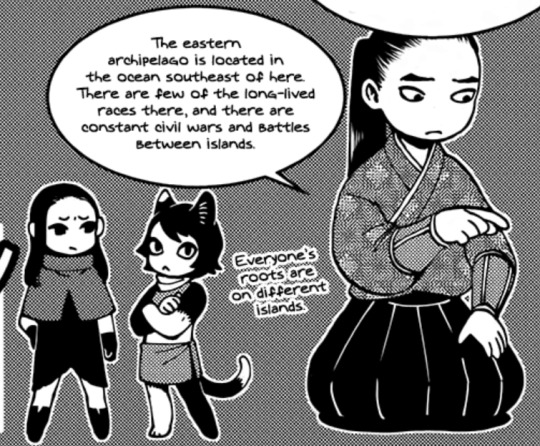
So yeah, that seems like it would be the backdrop of Rin's parents fleeing. As I said earlier, it's unclear if Rin might have any living family left back on her island. The listing she has for “family” in the Adventurer's Bible is just a dash, but so is Izutsumi's, for instance, and we know that she was taken from her family with no knowledge of who might still be out there. It's possible everyone else was killed, it's possible they were separated... it's possible that Rin's parents didn't even know.
As an additional note, and this is speculation on my part, but I think there is an argument to be made, with this tidbit from the cover as well as the Nakamoto clan's specialty in espionage and use of ninjas, that the politics of the archipelago are partially based on Sengoku era Japan. Not necessarily super relevant here, but I think it's interesting context for all... of the archipelago characters, honestly.
(Especially considering it seems like the Nakamoto clan is in a relatively comfortable position, and yet clearly are involved, or at least prepared to be involved in larger conflict. How stable is their position, really? How is Shuro's father viewed by the wider region and archipelago as a whole? What about his lord? NOT THE POINT THIS IS A POST ABOUT RIN. BUT IT'S VERY INTERESTING TO THINK ABOUT.)
Okay, back to Rin's parents.
Whatever caused them to leave, they made their way to the north, where they made their living with their magic for a time. There are no specifics about what kind of magic they used, but we know at least some examples of jobs that magic can get you, based on the flashback to Laios and Falin's childhood in chapter 26. Laios proposes that Fain could use her magic to be a priest, gravekeeper, or wandering exorcist. Though these are specific to Falin's affinity with spirits, they give some idea of the shape of the work that might be available. It's important, but it is also on the outskirts of society - not necessarily admired or appreciated by the average person.
And Rin’s parents were killed by vigilantes for that magic. It's not entirely news that superstitious villages in the area would sometimes kill magic users - we see a small drawing of people being burned at the stake in a panel towards the end of the manga:
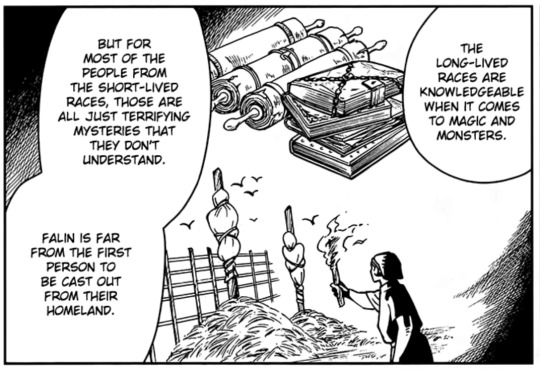
Nonetheless, Rin is the only person in the main cast who has experienced this brutality firsthand. And she did experience it firsthand, having been found by the elves as the sole survivor within the burnt ruins of her home.
It is unknown exactly how she survived, or what happened to her parents before and during the fire. Rin lived, and they did not.
The elves came some time after the fire, intending to investigate reports of ancient magic. They (and we) don't know if Rin's parents actually did use ancient magic, or if the reports and murders were simply spurred by general fear and superstition. Rin was the only piece of "evidence" that remained, and so she was taken back to the west with the elves when they left.
We don't know much about her time on the Northern Central Continent (where the elves/Canaries are based), but it doesn't seem like she was adopted or taken in by anyone the way that Kabru was. According to the Adventurer's Bible, after being taken into custody, "under their care she was treated as a captive animal would be." I would guess that means very basic food and shelter, little to no education. Probably the most social contact she got was from Kabru, as well as maybe, occasionally, from elves treating her as a curiosity, such as in this bit in the Adventurer’s Bible:
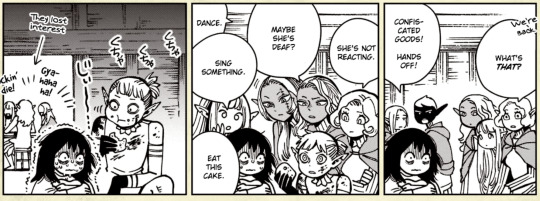
Assuming she left with Kabru (which seems like it is the case, there's no info about them having separated during that time), she spent 9 years with the elves, and has been with Kabru on the Island in the 4 years since then.
She also stays in the Golden Country after the end of the story, apparently working as an apothecary.
Additional Details (& Speculation):
What does she remember of her family and home?
I'd like to take a moment here to explore a little of what Rin might remember of her parents and home.
For reference, we can look at Kabru. The canaries came to Utaya when Kabru was 6, and he arrived in the capital when he was 7. He remembers the events of the tragedy in his home, and has some memories of his mother and life in Utaya, including memories of local dishes.
Rin lost her parents and home at 11, so she presumably has much clearer memories of the events that lead to her being taken by the elves... or she might, assuming that they haven't been completely blocked by her trauma from the event.
Yeah, I am fairly damn sure that she's got some memory issues from trauma and PTSD. For one, this is the state she was found in:

As already mentioned, she was also treated like something of an animal by the elves. She probably didn't have a lot of contact with other people, which would further perpetuate that sense of isolation and dehumanization. What I'm getting at here is that Rin probably didn't have much to help pull her out of this place, or heal these wounds. She had Kabru, who was also a kid and even younger than her, and she had herself.
Obviously trauma leaves different scars on everyone, and everyone responds and copes in different ways. But I do think it is interesting that we never hear anything about Rin's parents or life before the elves, and there are no real details about it given in the Adventurer's Bible the way we have for Kabru. What's presented is more surface level facts: they were refugees, they made a living with magic, they were killed.
I'm inclined to believe that things are laid out this way because that's how Rin holds on to these things. She knows things about them, but possibly remembers them more as things she was told/knows to be true, rather than actual memories she can picture herself experiencing.
Rin's Magic
In an interesting counterpoint to her potentially spotty memory, I do actually think Rin may have learned magic from her parents (or started learning, and was self-taught from there). She never attended a magic academy, and actually has a bit of grudge against people who did - owing to the social protection afforded to "upper-class mages," which her parents did not have. She also almost certainly wouldn't have been taught by the elves, who not only treated her as an animal but also knew her parents may have been involved with ancient magic.
Falin began to show signs of magical talent at 8, and was sent to the Magic Academy at 10, and that was as someone who had absolutely no guidance about or exposure to magic in her home town. Raised by two mage parents, I think Rin absolutely could have been learning some things by the time she was 11.
In terms of continued learning, I'll add that Rin is able to identify Marcille's magic as being A) from an Academy student, and B) cast by an elf:
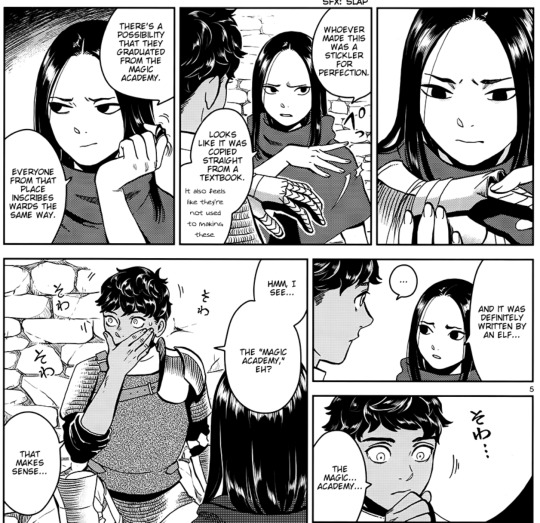
This makes me think that she continued to study magic on her own while held by the elves, and probably even more so after leaving with Kabru. They didn't form the party until two years after they left the elves, which would give Rin plenty of time to try and learn from other adventurers on the Island, or to study up on her own. She'd probably be able to pick up some dungeon-crawling basics (like the water walk spell), as well as become familiar with the skill level and expression of skill common in different people with different backgrounds (hence why she is able to comment on the "textbook" academy wards).
Much like Marcille, Rin also seems to rely on a 'one size fits all' Big Boom method of dealing with monsters: lightning. We see the best example of its power in the fight with Chimera Falin:
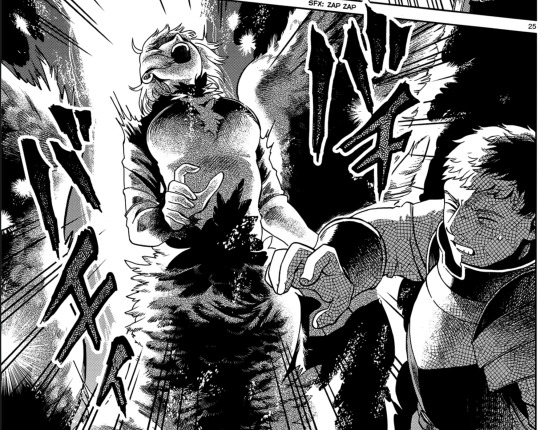
But we also see her cast it pretty recklessly in a few other places, including the end credits of the new anime ED, which I think provides a good example of the downsides to such an approach...

Yeah, it is very much a 'get out of the way or get zapped' spell.
Especially since Marcille's offensive magic is self-taught and works very similarly, this definitely reinforces the idea that Rin figured most of this stuff out herself.
Outfit and Character Design
Dear sweet Rin of the Red And Black... how I love her design.

First of all, her clothes are damaged. Despite the fact that Rin looks relatively well put together overall, her outfit is worn out. I have some theories on why this is that I'll get to in a bit, but for now I'll just touch on what this design communicates in general about it.
I think, just like with Kabru's horribly messy room, it creates a sense that there is something more complicated underneath the surface. Something that isn't being addressed or seen to, just as the dress hasn't been mended or replaced.
It also reflects her not caring a ton about her appearance. She's neat, but she's not concerned about being pretty, so she doesn't bother with fixing up her outfit after her dungeon crawls. This also fits with her perpetual scowl (which I will talk more about in a bit), and slightly disheveled hair.
Next: the gloves. At first I thought they might be a sort of uncomfortable-with-touch thing, but after skimming through the manga and some bonus content, I have another theory. Rin takes the gloves off to eat, as well as a few other instances, such as when working on a spell with Holm and Marcille in chapter 36

This one is especially interesting because she has them on in the next chapter, during the fight with Falin. Since she also isn't wearing gloves during some of the Daydream Hour art of her outside of the dungeon, that leads me to believe that they are specifically for combat.
What does she need them for, though? Most other casters we see don't wear gloves. Well... just look at the other half of the page where she attacks Falin with lightning:

She is enveloped by this spell. I said it before was pretty reckless magic, but maybe its not just a problem for her teammates, but for her as well.
So here's my theory: maybe the gloves are rubber, or some other electricity-resistant material? They might help protect her from her own magic. I don't know why a caster would need gloves for combat otherwise.
I also think this might be why her dress is tattered at the bottom, by the way. Especially since the Daydream Hour genderswap design doesn't have a similar problem with his outfit, since the tunic isn't as long.
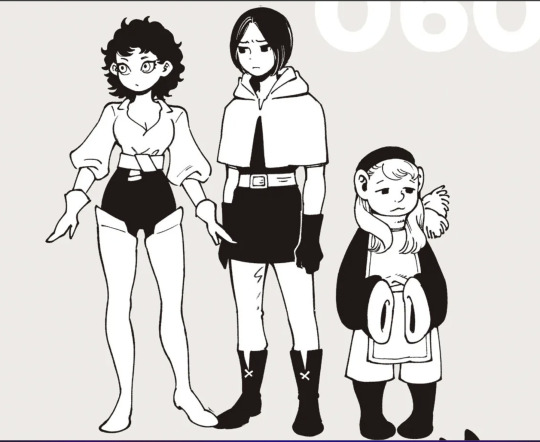
I will admit this is a bit of stretch/guess, but I think it's a fun one, and I wanted to share. I do think I'm right about the gloves being for dungeons/fighting specifically, at least. That seems pretty consistent throughout all of her appearances.
I also mentioned her scowl, so I'll touch on that briefly as well. The (fairly confirmed) explanation for Rin's expression is that she intentionally wears a frown to prevent her other expressions from showing through. I think it's important to emphasize that it's not just smiling that she is trying to suppress here - it's any strong emotion:
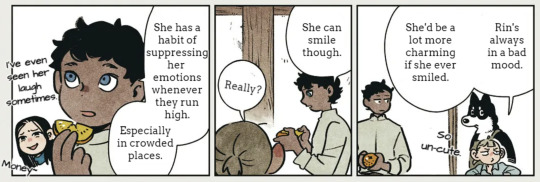
Anyway, because I can, here is the art of Rin smiling.
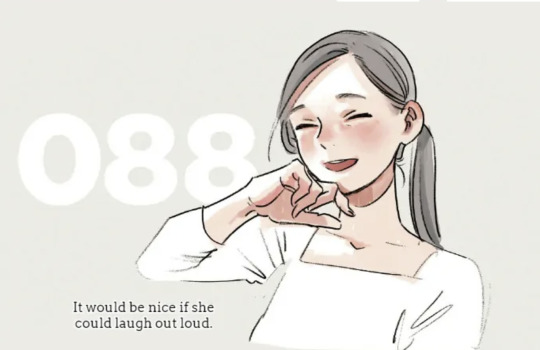
Rin and Kabru
I have talked a bit about Rin and Kabru's history, but I think it deserves its own section.
I think it's very interesting that Rin is pretty much the ONLY character in all of Dungeon Meshi that has explicit canonical romantic interesting in someone. It's literally part of the main summary sentence in her character profile.

This could be sort of reductive as a way to describe a female character (and in some ways it still is), but I think in part the simplicity and directness of it actually is part of what makes it so interesting. Especially when on the very next page we see the comic about her backstory. "This mage is in love with Kabru" -> one page of a horribly traumatic event and a child frozen in shock with no one to comfort her. What does that do?
Well, in my opinion, it shows how much Rin focuses on Kabru as something to keep her in the present. In contrast with the immense loss she has experienced, her love for Kabru is current and alive. He has presumably been her anchor for years, and I think that her love is part of that anchor.
Adding to this, in contrast with how explicit her feelings are, she never seems to actively pursue Kabru. She complains about his potential interest in other women, but she doesn't really flirt. She doesn't let herself smile around him any more than anyone else, and she doesn't hide her bitterness or anger from him to present a more appealing persona.
As much as she craves Kabru's attention, and has stayed by his side for years, I don't know that she really wants to possess him. He seems to know about her feelings, more or less, and she seems to know that he knows. Maybe she believes he doesn't reciprocate and is respecting that, maybe she's afraid of what she could lose if she tried to change things, or maybe the change itself frightens her. In any case, though she's not exactly happy with the way things are between them, she doesn't seem to be trying to change that status quo.
A specific thing I'd also like to talk about with their relationship, beyond Rin's love for him, is her fear for him. As the Adventurer's Bible puts it, "she worries that his knack for dealing with whatever life throws at him might lead him to get too full of himself and end up in serious trouble."
Rin is an interesting mix of restrained and explosive, herself. Her magic is destructive, her temper seems to run hot (she gets annoyed easily, at least), and her feelings for Kabru are apparent. At the same time, she doesn't let her emotions show on her face, she is the one who bluntly states that the group has hit the limit of their abilities, and she doesn't act on those obvious feelings for Kabru. It's interesting, then, that what she fears for Kabru is that he won't restrain himself.
And a small personal idea about that as well: I wonder if she somewhat blames her parents for getting killed. Again, this is very speculative, but I think it's interesting that her fear for Kabru is that he will get too full of himself. Take up too much space. It's never really stated what Rin thinks of her parents, but it can be easy in grief to search for control, and control often means blame. If they hadn't been so confident, so flashy, would they still be alive...?
I don't know if she's ever thought like that, and it could well be that her fears for Kabru come from a totally different place. But it's an interesting connective thread between her past and present - the idea of "getting in trouble" for taking up too much space and being too confident in one's own abilities.
Miscellaneous Tidbits:
On that note, I'd like to wrap up the main part of this post, and move on to a few extra things that I couldn't find another place for.
Rin plays with her hair when she's stressed
Using stressed as a pretty big umbrella here, because I think it's hard to perfectly pin down all the emotions at play, but it is a habit of hers. Best displayed in chapter 32, but it shows up in other places, too.
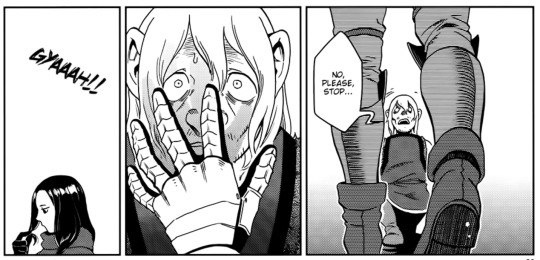
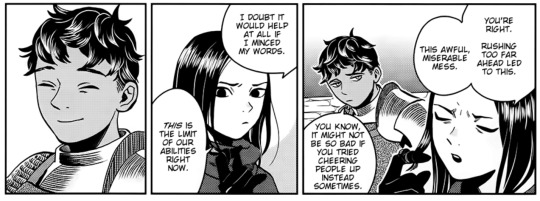
Her design contrasts with Marcille
This is a small thing, but I just love how much they are visual opposites.


Rin wears red and black and has dark hair, Marcille wears blue and white and has light hair. Marcille cares a great deal for her hair and puts it up in elaborate hairstyles, and Rin's is mostly loose and a bit messy. Marcille was even educated at the Magic Academy, which Rin dislikes. They both have little capelets. Also they both look very cute in each other's clothes.
Rin knows Flamela (and they meet again in canon)
Nothing much is done with this in canon, but I think it’s super interesting that Flamela's squad are the ones that find Rin as a child and take her away to the west, and then they end up stuck in the dungeon together for a bit.
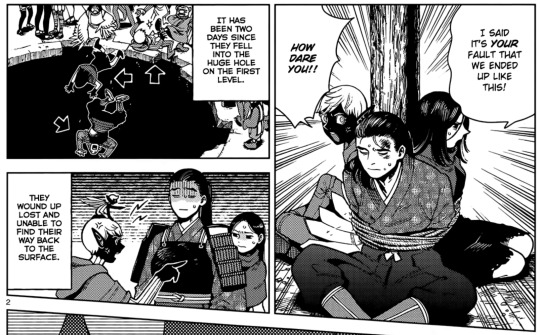
Two days??? I'm so very curious what things were like between these three.
Aaaand I think that's all I have to say about Rin! For the time being at least. There's a lot more analysis that could be done about her and Kabru especially, but for this post I wanted to keep things at least somewhat anchored to canon facts, with only a layer or two of speculation on top.
If it isn't already obvious, I think Rin is a super interesting character with a ton of potential depth to explore. She mostly interacts with Kabru in canon, but has ties to a bunch of other characters: she and Marcille fill similar roles in their parties but have differing personalities and histories, she and Falin (and Laios) have been tremendously shaped by xenophobia and fear of magic common in the Northern Continent, her parents fled from conflict in the same region Shuro and his retainers are from, and she has history with Flamela and some of the second canary squad.
Her temper, her fear, her love... her repression and passion - they all inform her character, even in small ways, even with as little time as she spends on the page.
#dungeon meshi#delicious in dungeon#rinsha fana#rin dungeon meshi#dungeon meshi spoilers#dunmeshi analysis#thank u to anyone who takes the time to read this ♥️♥️♥️ I love rin and lot
536 notes
·
View notes
Text
Something that has been driving me insane about the credits are these sections with the fish so please bear with me whilst I do a mini deep dive (hehe) into fish discourse because YO, we need to talk about these fish!
Notice how at the beginning of the credits we actually have two white fish swimming along beside one another; one with bright turquoise eyes and the other with black.

A little while later the fish begin to circle each other and a droplet falls into the water between them. As the disturbance ripples out from the center, one of the fish dives deeper into the water and changes its colour to black; symbolizing Geto's change and descent into darkness
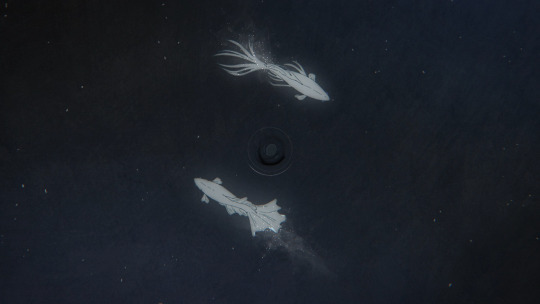
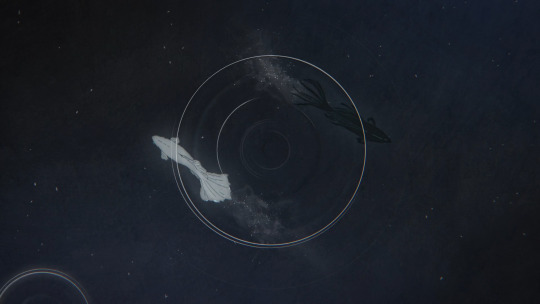
Then we have this heartbreakingly beautiful moment with Gojo and Geto:
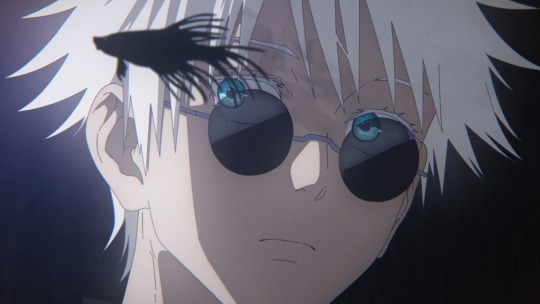
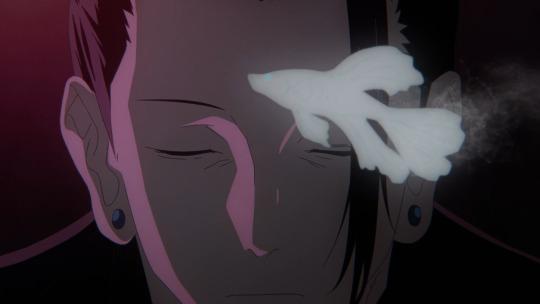
I cannot stop thinking about how long Gojo watches the black fish for as it swims across the screen, whereas Geto's eyes are lowered the moment the white fish appears and he closes them as it swims past.
Gojo cannot bear to tear his eyes away, whilst Geto cannot bear to look

Throughout the credits, Gojo and Geto have been making their way towards each other through the pouring rain (or mostly sitting and waiting in Geto's case). At the end, they meet each other under a bridge and as they walk away together we see the fish a final time, swimming together again in a puddle formed by the heavy rain.
Geto walks on the left in the light, as the white fish swims close to his head, almost invisible in the brightness of the light. Whilst Gojo walks on the right in the shadow with the black fish swimming further away but still close by.
The fish speed after the two men before disappearing completely under the water just before the camera pans up and we watch as Gojo pulls Geto in for a hug as they walk away, before he's playfully shoved away by Geto.
There's a lot going on the credits (+ opening) that is absolutely killing me but man, these fish?! Breathtaking.
#just been sitting here for 20 minutes sobbing over fish discourse bc altho they only appear very briefly they are saying SO MUCH#i haven't read the manga so i sadly cannot provide a deep dive stsg analysis so would love to hear other people's thoughts#also apologies as I know some people haven't even had a chance to watch ep 1 yet but i need to scream into the internet about these fkn fis#stsg#satosugu#gojo satoru#geto suguru#gojo#geto#jjk#jjk s2#jjk s2 ep1#jjk season 2#jujutsu kaisen season 2 spoilers#jujutsu kaisen season 2#jujutsu kaisen
2K notes
·
View notes